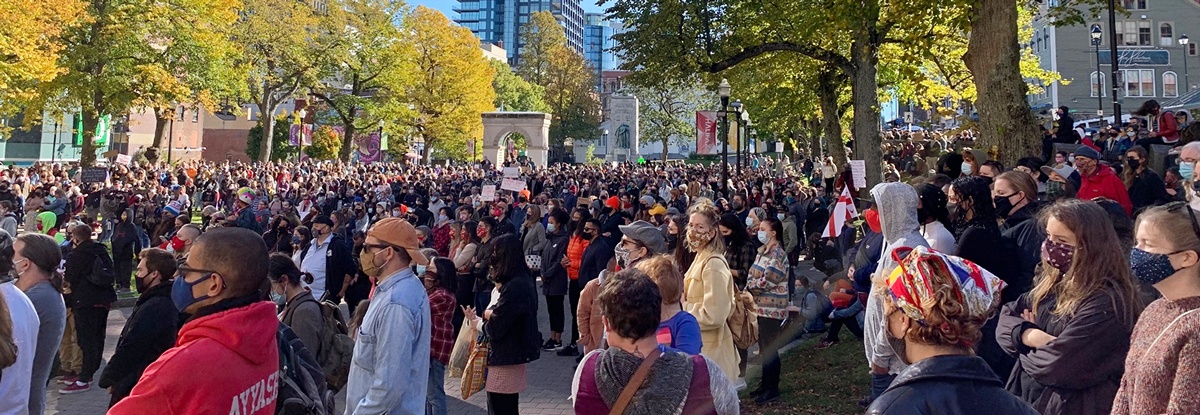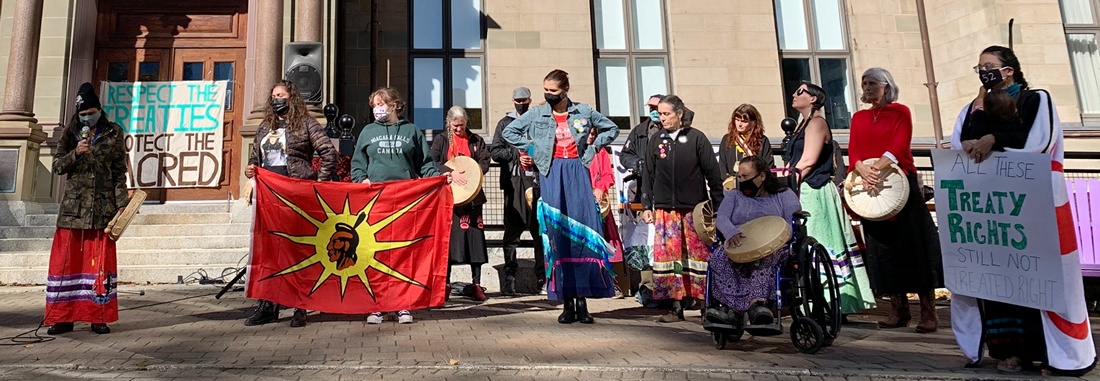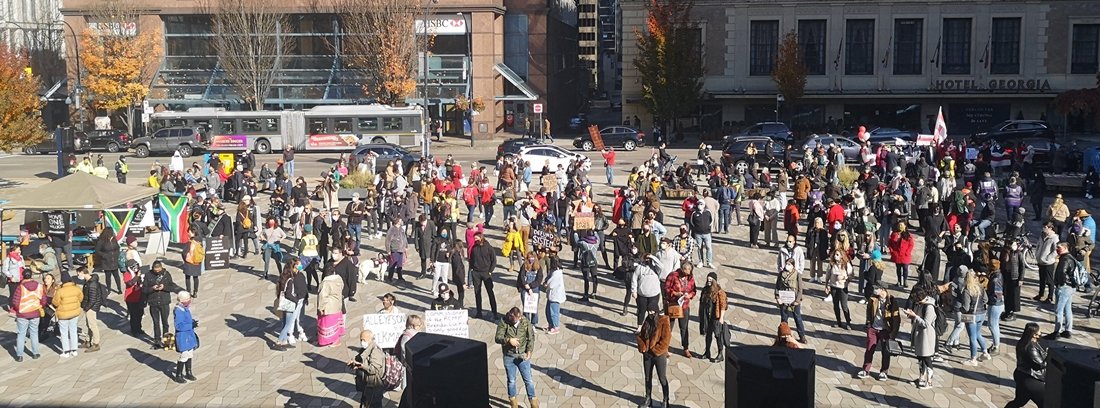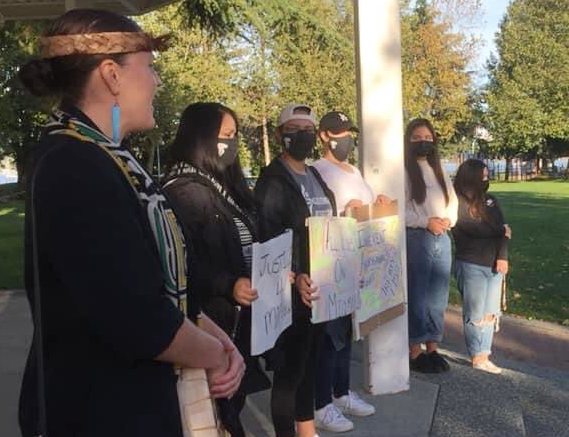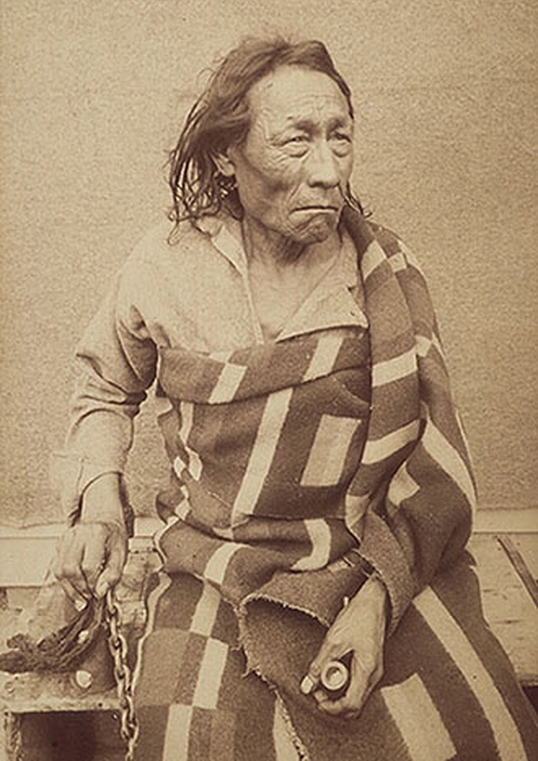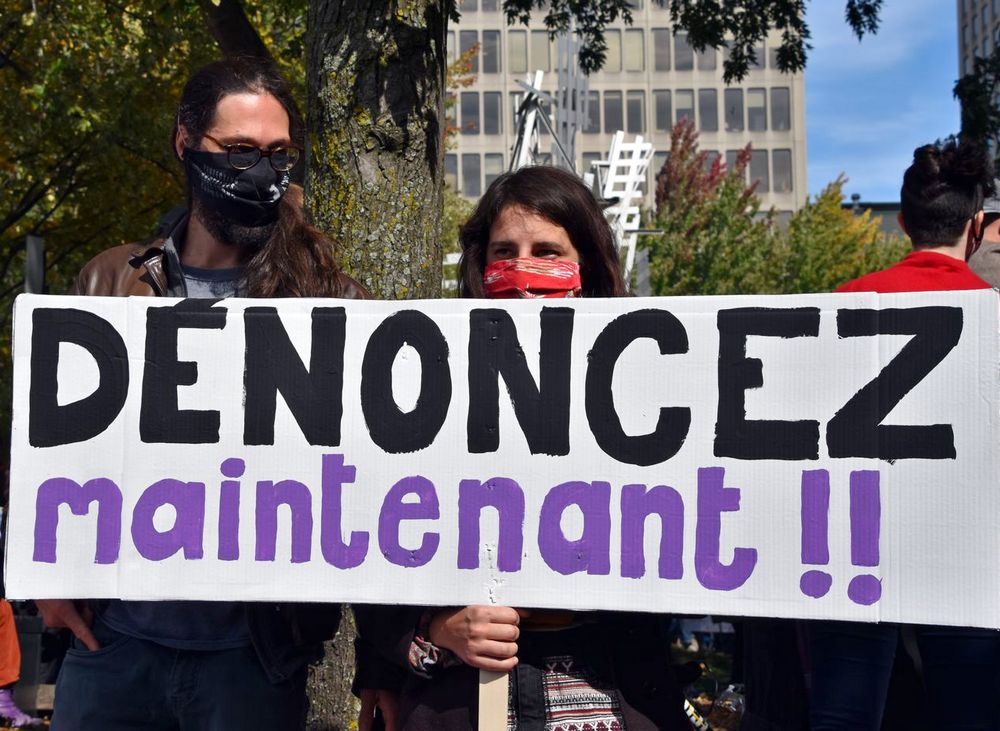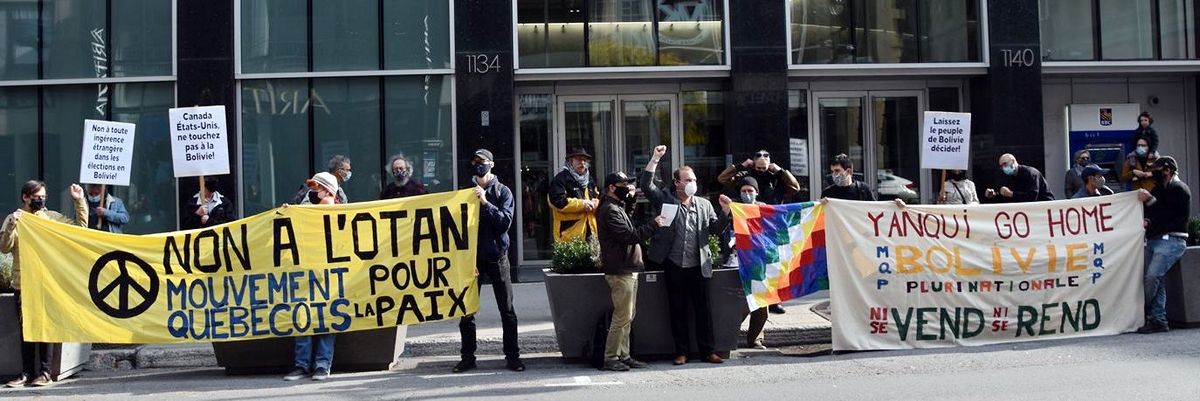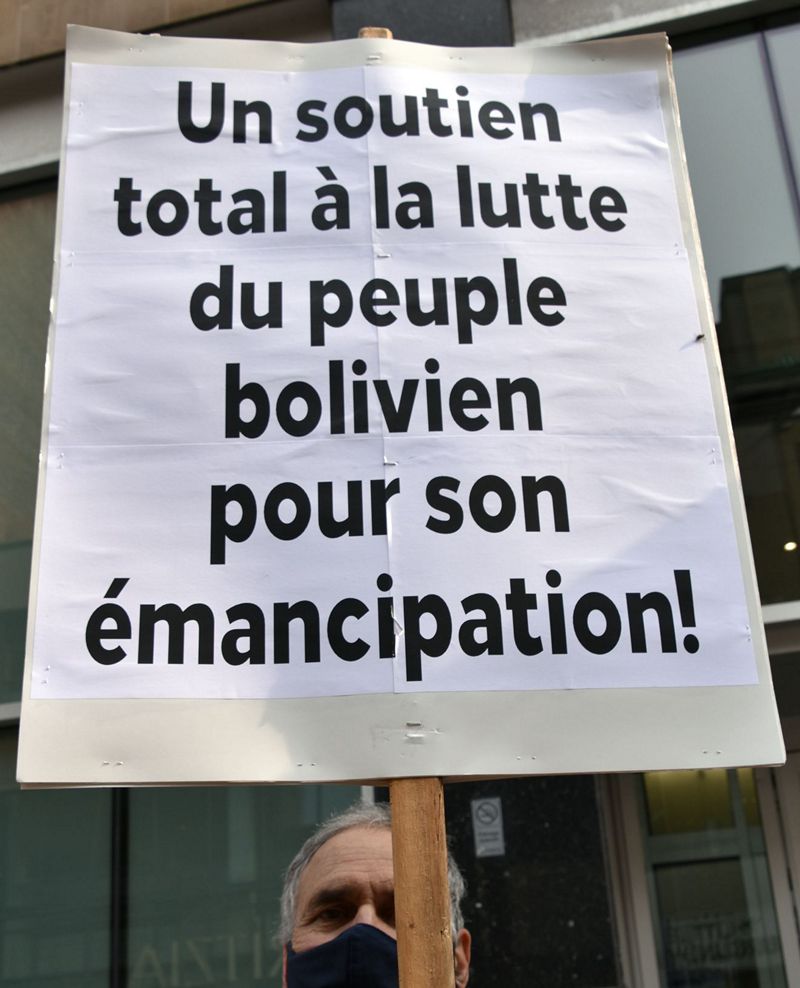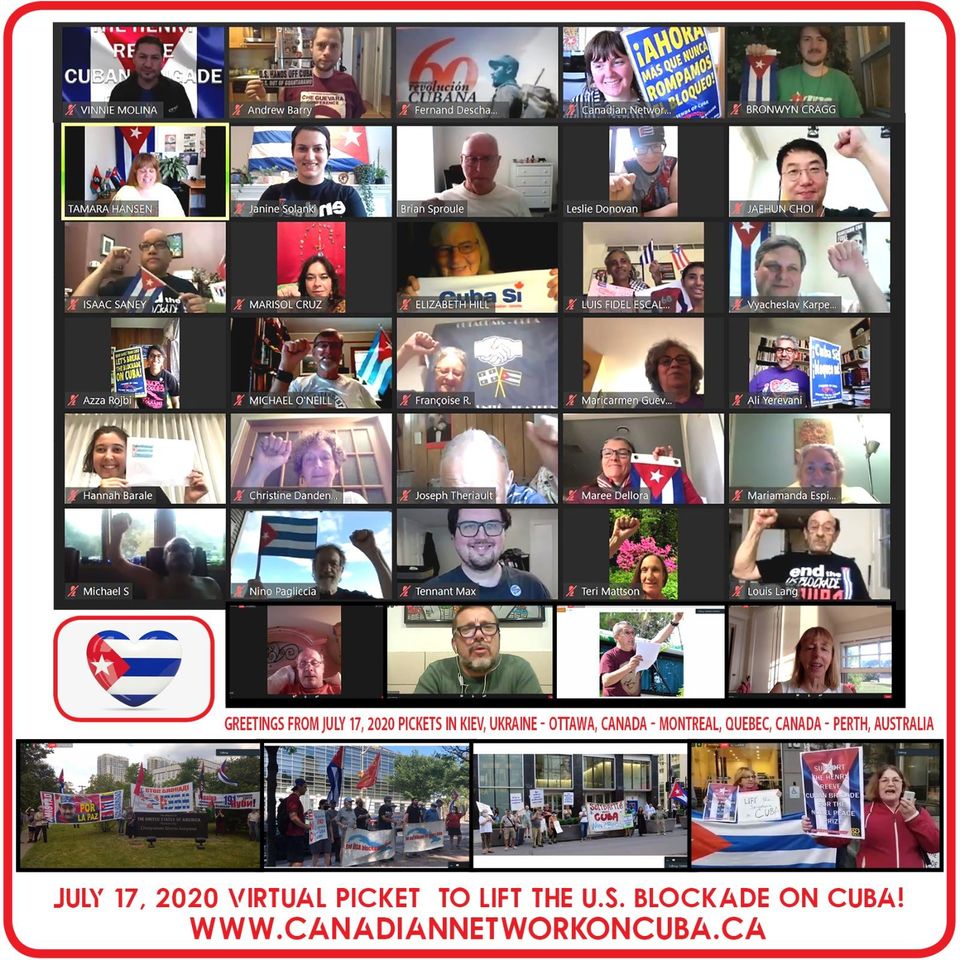
| October 24, 2020 - No. 40 Canada's
Strategic Critical Minerals: Integration of Quebec's Northern Regions into U.S. War Economy
• Canada's
Role in Guaranteeing Supply Chain of • Bailouts of Private Mining and Metallurgical Ventures All Eyes on Mi'kma'ki • Stand
with
Mi'kmaq People in Defence of Their • Hands Off the Mi'kmaq Nation! - Philip Fernandez - • Canada's Racist Colonial Heritage - Letter to the Editor -
• Former Police Officer Appointed Minister Responsible for Indigenous Affairs in Quebec - Christine Dandenault - •
Activists
and Residents in Peel Region Continue to - Lorne Gershuny -
• Mass Mobilization Sweeps Reactionary
Coup Forces from Office
• Plebiscite on New Constitution and
First Anniversary of Revolt Against Neo-Liberal Piñera Regime
• Canadian Network on Cuba Holds Virtual Conference • Virtual Conference on Current Situation
in Cuba
• Sixth National Convention Highlights Achievements and Challenges - Pablo Moctezuma Barragán -
• Canada's Dirty Role to Advance U.S.
Imperialist Aims in - Margaret Villamizar - Canada's Strategic Critical Minerals: Integration of Quebec's Northern
Regions |
|
|
Idle No More has called a National Week of Action in support of the Mi'kmaq people's right to fish on their unceded territories. Their callout points out, "The inaction of the federal and provincial government and the RCMP to protect Mi'kmaq people is a violation of Indigenous inherent rights, Treaty rights, and the United Nations Declaration on the Rights of Indigenous People. This is not reconciliation."
 Over 250 years
ago the Peace and Friendship Treaty of 1752 enshrined the Mi'kmaq
people's right to hunt and fish their lands and establish trade. In
1999, a landmark Supreme Court of Canada ruling, R v. Marshall,
recognized that the Mi'kmaq and Maliseet people had the right to hunt,
fish and gather for a moderate livelihood.
Over 250 years
ago the Peace and Friendship Treaty of 1752 enshrined the Mi'kmaq
people's right to hunt and fish their lands and establish trade. In
1999, a landmark Supreme Court of Canada ruling, R v. Marshall,
recognized that the Mi'kmaq and Maliseet people had the right to hunt,
fish and gather for a moderate livelihood.
Governments have for 20 years delayed implementing the court ruling, including by refusing to define what constitutes a "moderate livelihood." Nova Scotia law still prohibits Mi'kmaq from selling what they harvest even though their treaty rights include the right to do so. Meanwhile the Department of Fisheries and Oceans has given Clearwater, North America's largest shellfish producer, a near monopoly on lobster fishing in the region to the detriment of Indigenous and non-Indigenous fishers and of the conservation of the fishery itself.
Faced with government inaction, the Sipekne'katik First Nation became the first to start its own self-regulated moderate livelihood fishery, on the 21st anniversary of the Marshall decision, September 17. Since launching the fishery they have faced intimidation, violent attacks and vandalism, while the RCMP has stood by.
Halifax, NS
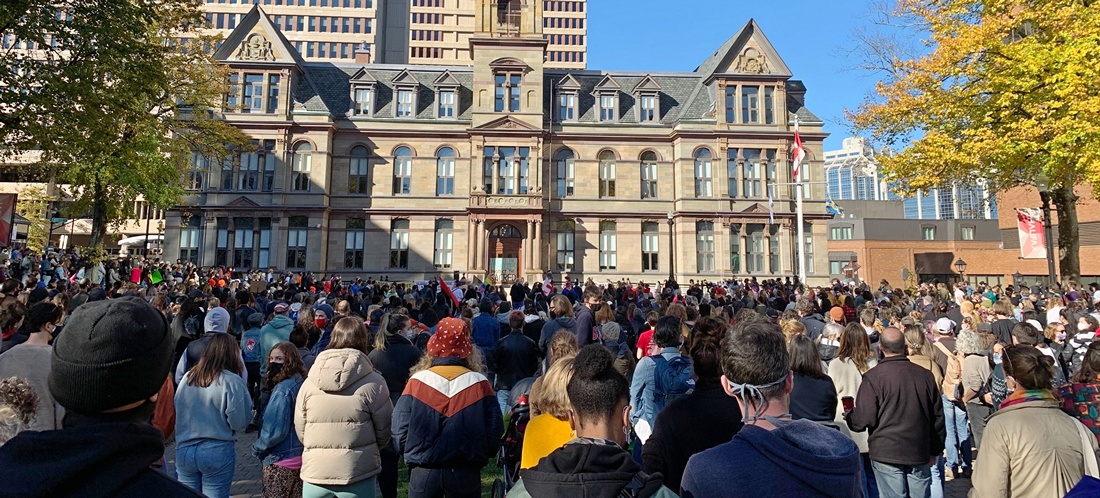
Rally October 18, 2020.

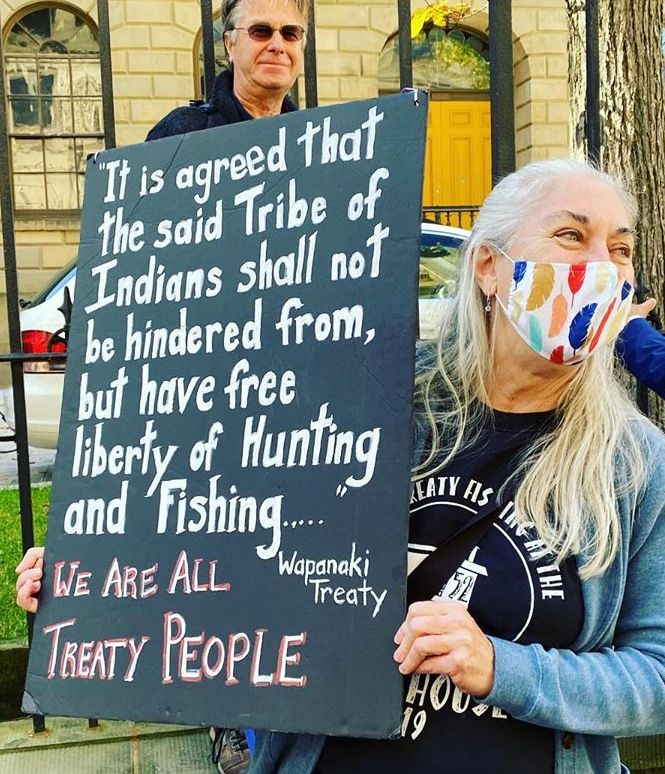
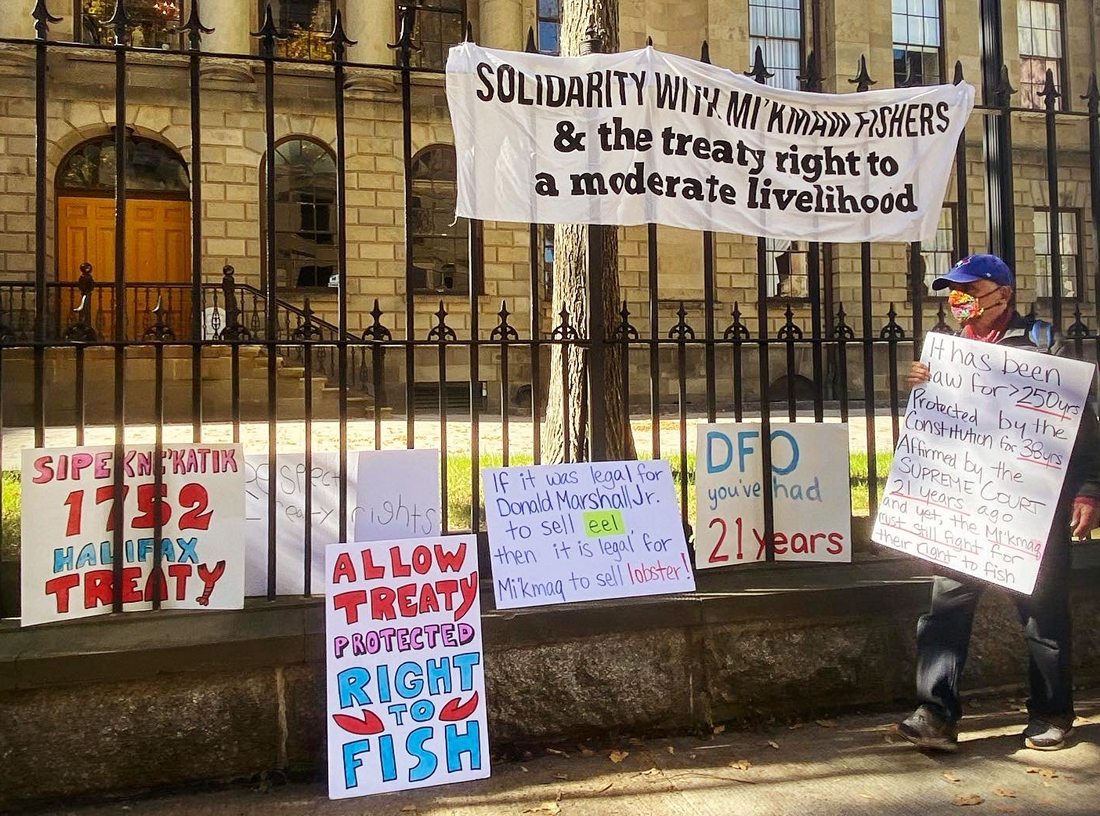
People
line up to buy lobster from Mi'kma'ki fishers outside provincial
legislature,
October 16, 2020.
Fredericton, NB

Saint
John, NB


Kahnawake, Mohawk Territory
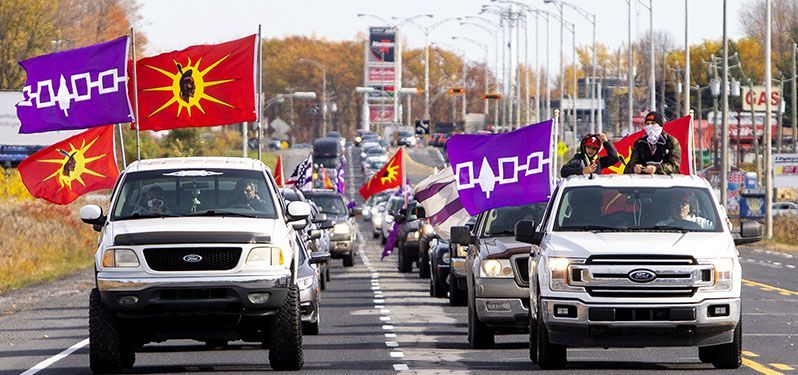
Ottawa, ON
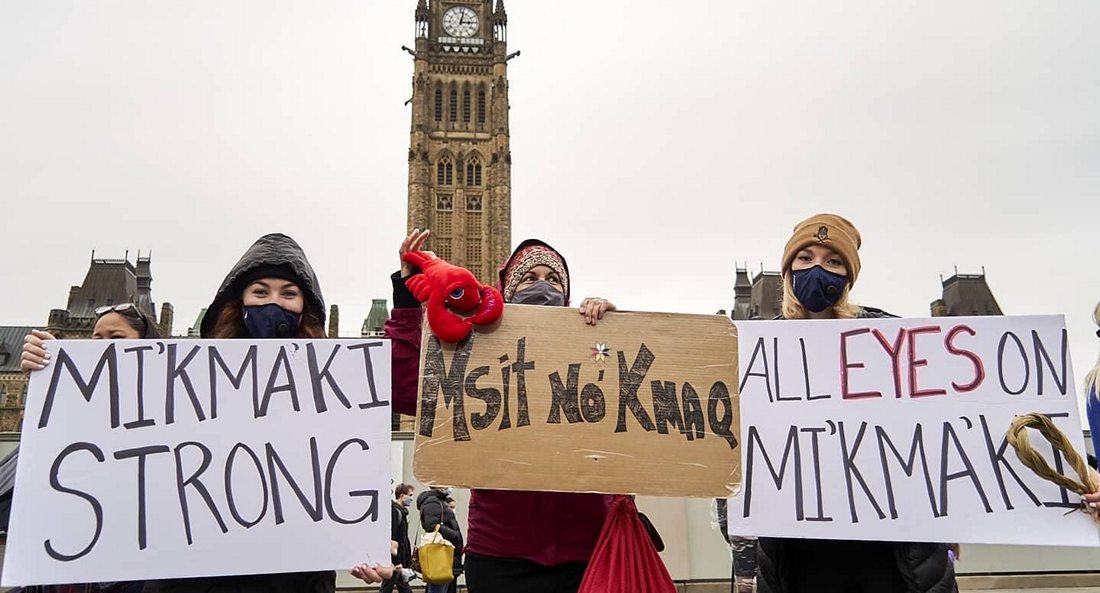

Kingston, ON

Rolling
Blockade, Serpent River First Nation
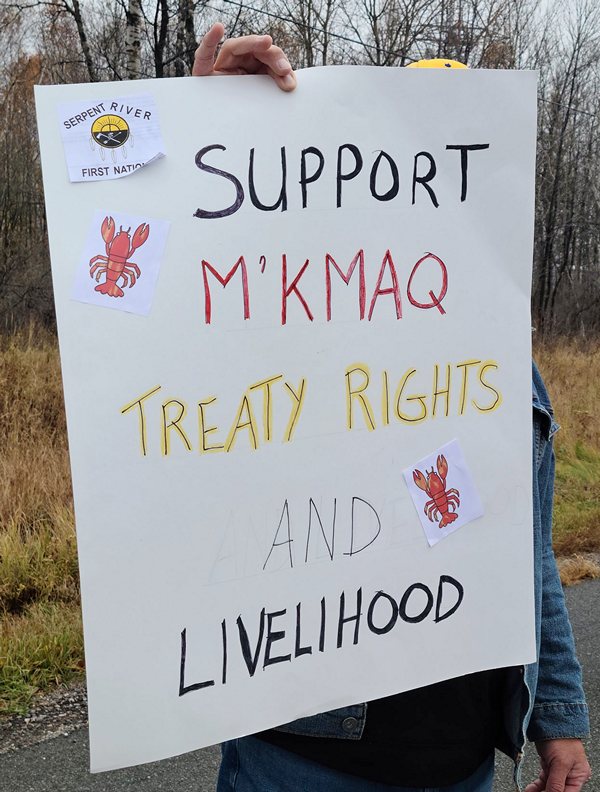

Toronto, ON

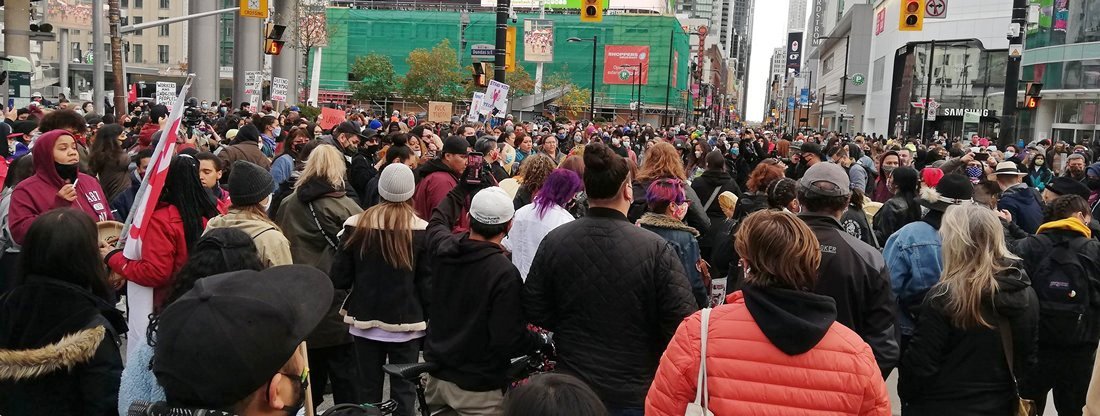
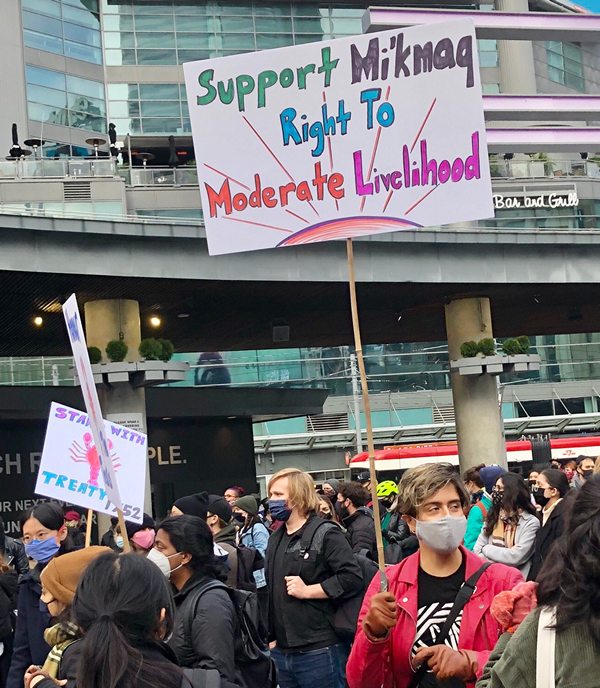
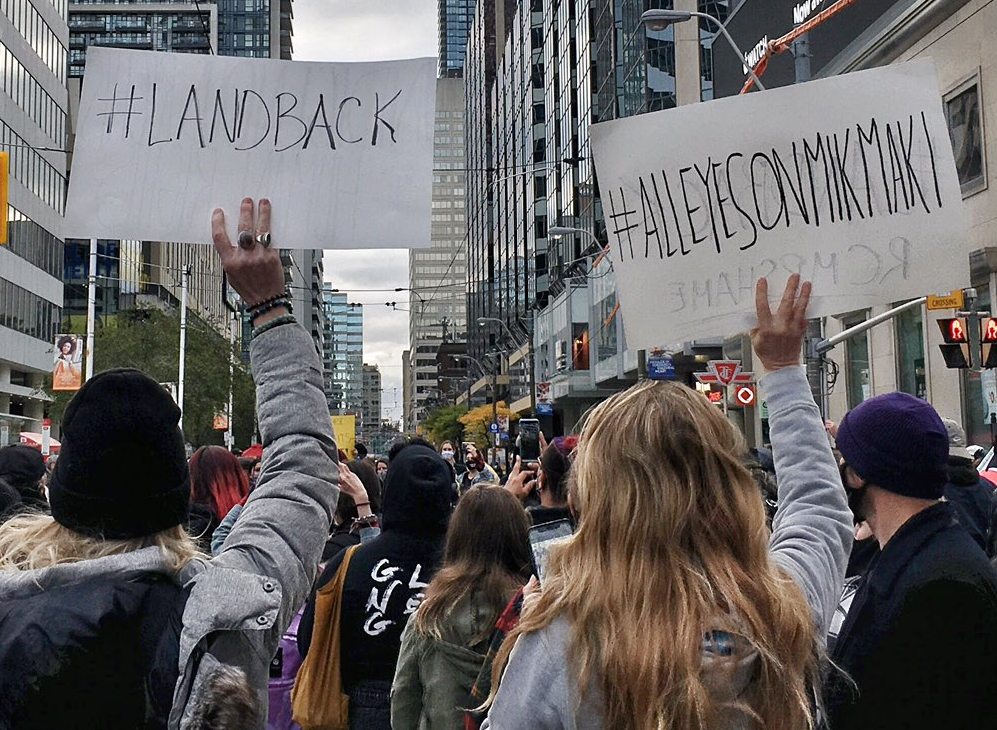
Six Nations of the Grand River
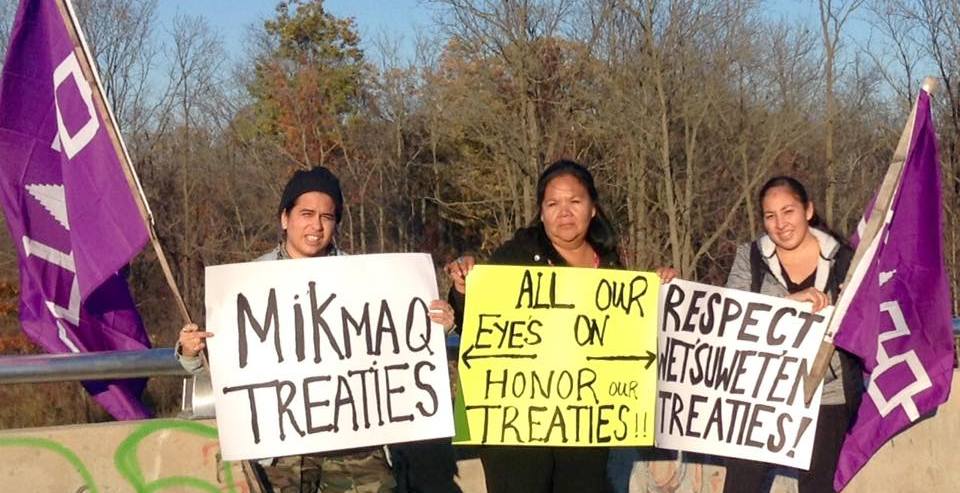
London,
ON
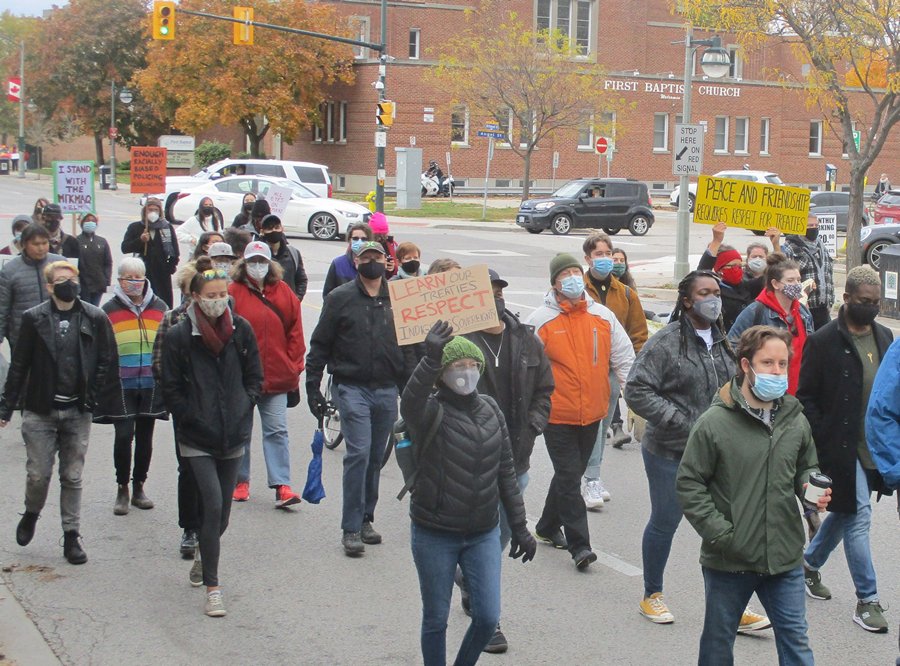

Winnipeg,
MB
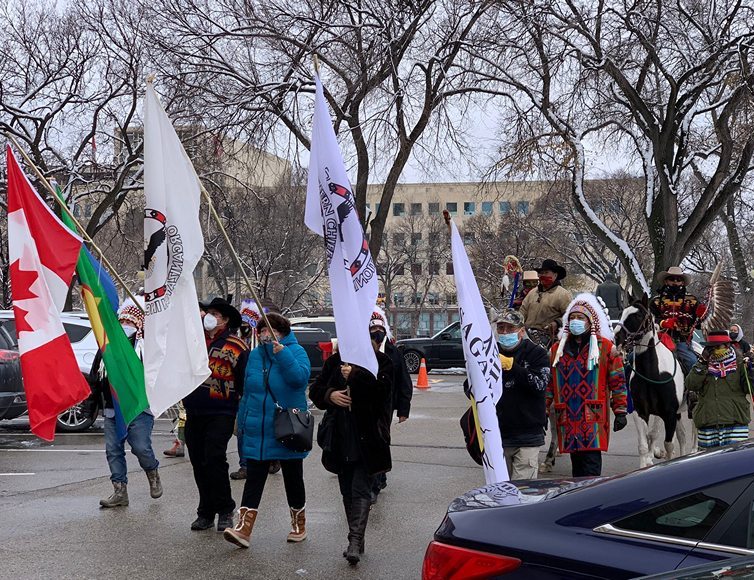
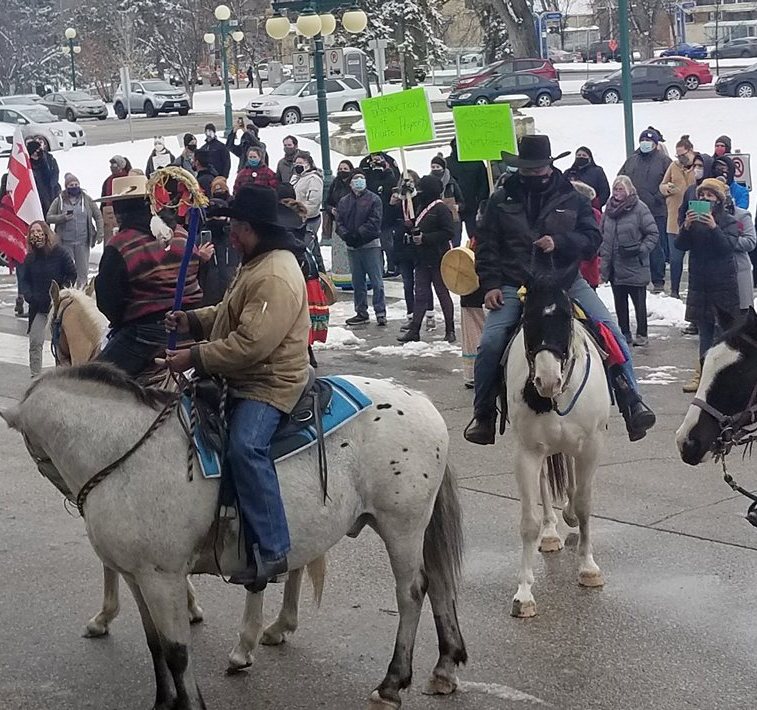
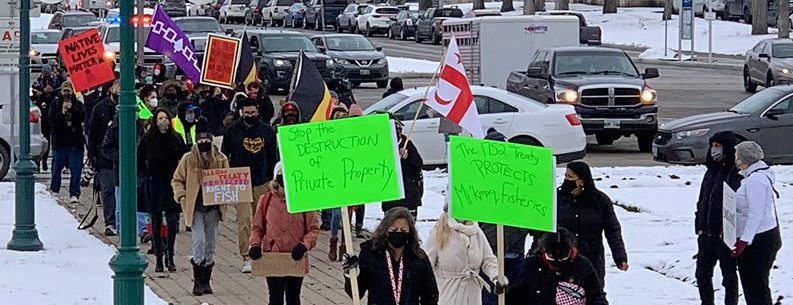
Saskatoon,
SK
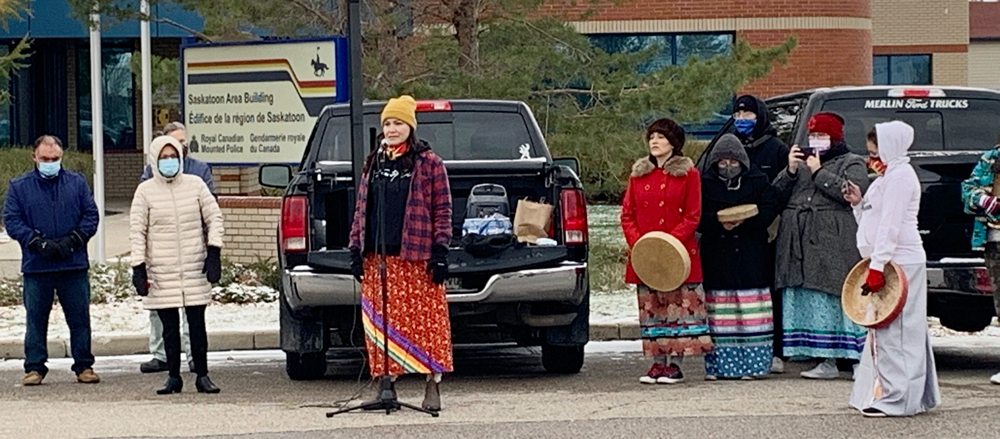
Southern
Saskatchewan
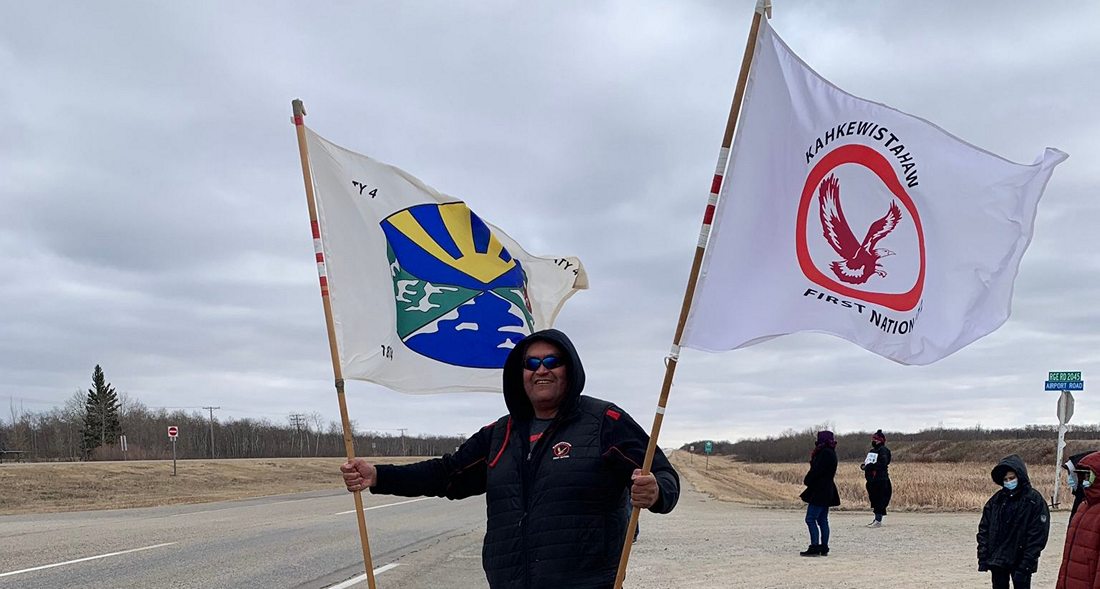
Calgary, AB
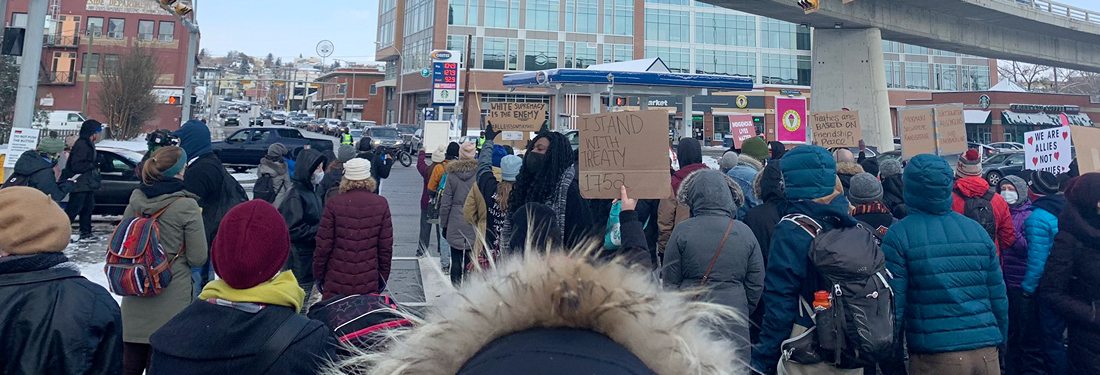
Edmonton,
AB
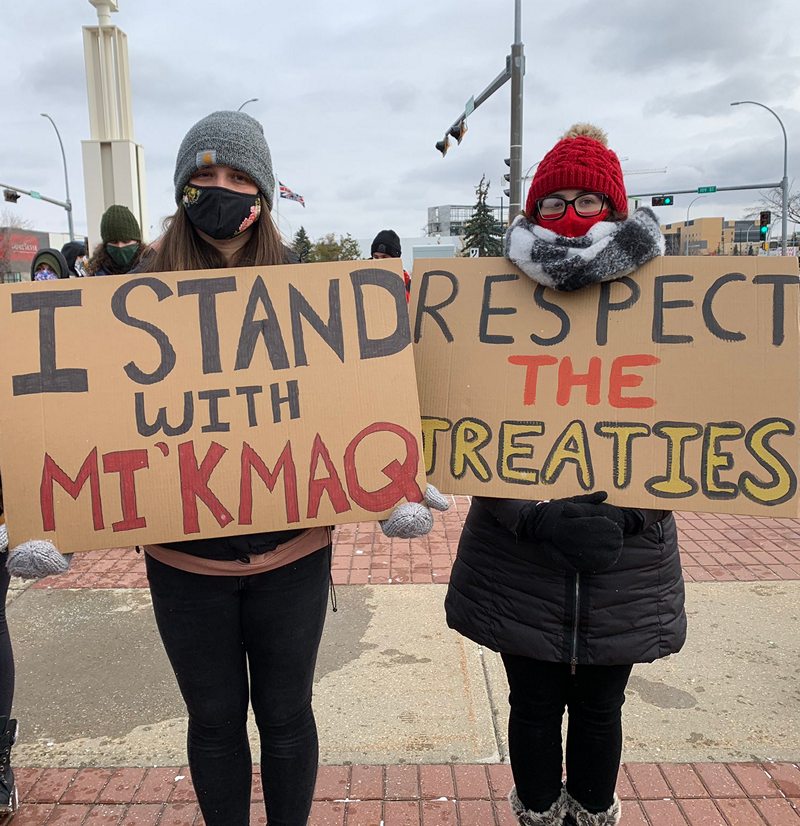
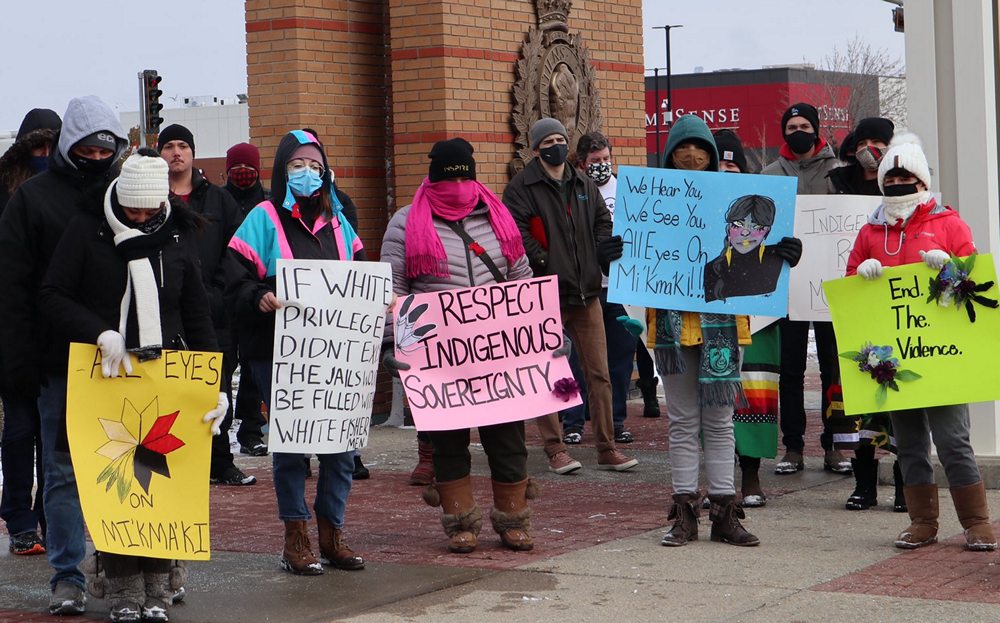
Vancouver,
BC
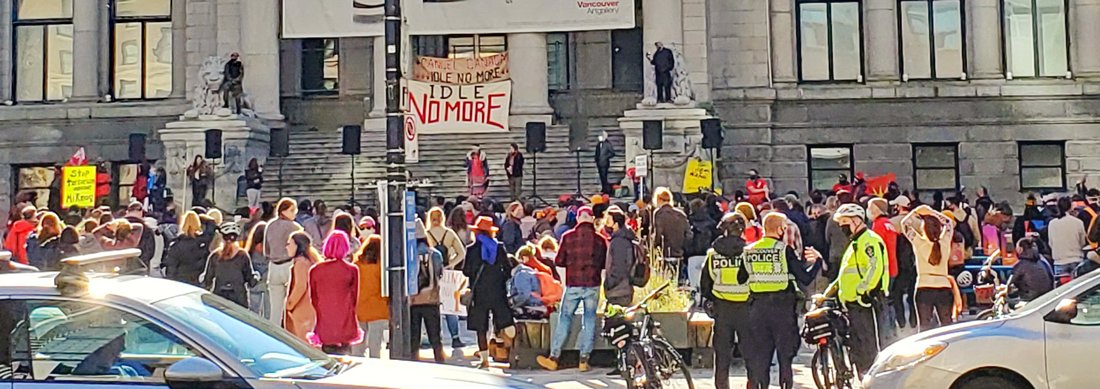
Nanaimo, BC
BC
West Coast

(Photos: B. Bourdeau, S. Gomez, Spring Mag, Shades of Green, BLM Fredericton, G. Horn, M. Marshall, A. Ede, S. Butler-Hassan, Rose, S. Harris, K. LaPointe, B. Sinclair-Waters, R. Small, Real People's Media, S. Maddocks, K. Legra, C. Hanson, Kahkewistahaw, Alania, Occupy WSIB, M. Dunn, P. Kirman, M. Charleson, D. Ross, King Salmon.)
Hands Off the Mi'kmaq Nation!
For more than a month Mi'kmaq fishers of the Sipekne'katik First Nation in Saulnierville, Nova Scotia have been subjected to brutal violence, arson and destruction of property for daring to assert their hereditary and treaty rights. Government officials from Trudeau on down -- the Minister of Indigenous Services Marc Miller, Public Safety Minister Bill Blair, Minister of Fisheries, Oceans and the Coast Guard Bernadette Jordan and others -- blame everyone but themselves. They "condemn" the violence, stand aside while it happens, and wring their hands over Canadians being "racist," when in fact it is the Canadian state which is responsible and must be held accountable.
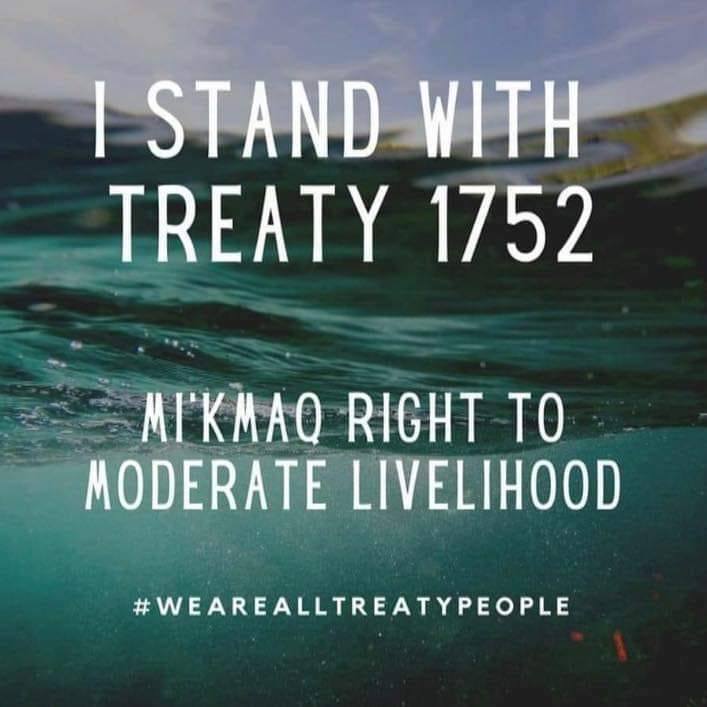 The Sipekne'katik
affirmed their hereditary and treaty rights, in launching a
self-regulated, sustainable lobster fishing enterprise on September 17.
Eleven Indigenous fishers were awarded licences by the First Nation.
The day their fishing enterprise started, federal Minister of Fisheries
Bernadette Jordan declared the Mi'kmaq outlaws.
The Sipekne'katik
affirmed their hereditary and treaty rights, in launching a
self-regulated, sustainable lobster fishing enterprise on September 17.
Eleven Indigenous fishers were awarded licences by the First Nation.
The day their fishing enterprise started, federal Minister of Fisheries
Bernadette Jordan declared the Mi'kmaq outlaws.
In a statement issued September 17, she acknowledged the Supreme Court's Marshall Decision, stating that "First Nations have an affirmed treaty right to hunt, fish and gather in pursuit of a 'moderate livelihood.'" But she did not say Canada would abide by the Court ruling. Rather she called on the Mi'kmaq "to find a collaborative path back to the negotiation table."
Until then, she said "there cannot be a commercial fishery outside the commercial season. ... Fishing without a licence is a violation under the Fisheries Act and anyone fishing outside the activities authorized under a licence may be subject to enforcement action."
In other words, the Sipekne'katik First Nation lobster fishery is illegal because the colonial racist state has not authorized it. The state declares the Mi'kmaq outlaws, making them fair game for violence against them.
This is the modus operandi of the Canadian state: violate hereditary and treaty rights and when Indigenous people affirm their rights, they are met with violence. Since 1990 alone, attacks include the police and military assault on the Mohawk of Kanesatake at Oka in 1990; the Shuswap people at Gustafsen Lake in 1995; the Ojibway of Stoney Point in Ontario in 1995; and earlier this year the Wet'suwet'en people in northern BC, when they asserted their sovereignty and opposed the Coastal GasLink pipeline being built on their territory.
| |
The Mi'kmaq people are no strangers to state-organized violence and racism either. Following the Marshall ruling in 1999, Mi'kmaq fishers of Esgenoopetitj First Nation (Burnt Church) in New Brunswick faced three years of threats, violence and arrests for asserting their treaty and inherent right to fish. At that time Canadians were outraged to see video footage of RCMP and Department of Fisheries and Oceans enforcement officers ramming Mi'kmaq fishers' boats and endangering their lives to "uphold the law."
A month ago, faced with attacks, the Assembly of Nova Scotia Mi'kmaq Chiefs declared a State of Emergency. The Trudeau government did not act to end the violence. RCMP officers stood by, watching and videotaping. Were they at the ready to intervene should Mi'kmaq resistance "turn violent"? That's what it looks like. The RCMP were quick to act with violence against the Wet'suwet'en on their own territory. The contrast is not lost on the Canadian people.
The Mi'kmaq are not intimidated. Chief Mike Sack of the Sipekne'katik First Nation and fishers of that community say they will continue to assert their rights. They say Canada has to not only recognize their rights but defend them. The resistance of the Sipekne'katik First Nation has inspired others such as the Membertou First Nation of Cape Breton Island to do the same.
The affirmation of their rights by Indigenous peoples has the broad support of the people of Canada and Quebec.
Canada --
Hands Off the Mi'kmaq Nation!
No to State-Organized Racist
Violence!
End Colonial Injustice!
Uphold the
Hereditary, Treaty and Constitutional Rights of Indigenous Peoples!
Canada's Racist Colonial Heritage
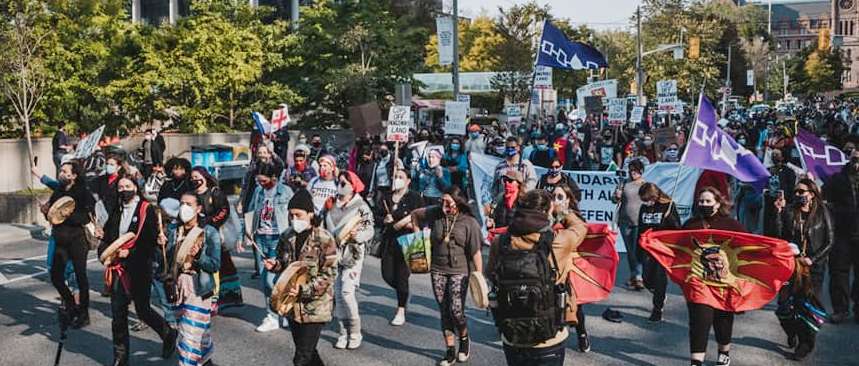
Land Back
march in Toronto, October 9, 2020 stands with Six Nations of
the Grand River 1492 Land Back Lane occupation. (N.G.
Farreal)
Simultaneously with the attacks in Nova Scotia, a judge in Ontario has issued an order for land defenders of the Six Nations of the Grand River to vacate 1492 Land Back Lane on Six Nations' land near Caledonia or face arrest. The Ontario Provincial Police appear to be mobilizing for greater violence against the Indigenous land defenders.
All these problems are rooted in the racist colonial heritage of what is called Canada. When the news broke of the violence in Nova Scotia, I immediately thought of undercover police agents up to dirty tricks, as is usually the case. Whenever workers face insecurity of a livelihood and their future, state agents come along to blame the national minorities, the Indigenous peoples, and immigrants for their problems. In this way, the governments, corporations and rich oligarchs, those who actually have power and set the direction of the economy, try to avoid accountability and a new direction. Even worse, the Government and the police power, either local or RCMP, or the military, are called upon to enforce a racist "peace" and set things straight as if they are disinterested parties.
| |
We are not blind to the reality that the original mission of the RCMP was to suppress the Indigenous peoples of the Prairies. See the photo [on the left] of the great Prairie Cree Chief Mistahi Maskwa (Big Bear) being humiliated in chains in jail just prior to his death in 1888. His "crime" was that of leading the resistance of his people against the attacks of the racist colonial Canadian state.
The oceans and fishing industry has been exploited and wrecked for decades by big private corporate interests with the help of governments at all levels that provide the legal green light. The life of a fisher is precarious, "seasonal," and the industry has gone from smaller boats to mostly big commercial fishing in a few generations with the inshore fishery constantly threatened with destruction by the offshore giants. People's lives have been turned upside down as in Newfoundland with the destruction of the cod fishery. Within this turmoil people are scrambling to survive and looking for solutions.
A part of looking for solutions is investigating who is to blame for the problems and what social force and consciousness will provide a path forward and to bring the New into being. The ruling elite do everything in their power to block working people from seeing that they are the solution through finding and forging a new pro-social direction for the economy and country. A most common method to thwart the ambition of the people to find solutions that serve their common interests is to divide the people and pit them against each other instead of against the ruling elite and their colonial state and police powers.
The fact that Indigenous fishing makes up a small fraction of the lobster catch is a dead giveaway that foul play is at work, meaning a deliberate fostering of hatred and tension towards the Indigenous peoples by those in power. Federal Minister of Fisheries Bernadette Jordan fanned the flames in the usual thinly veiled Liberal way, basically saying the First Nations are poaching lobster. Jordan, who is also the MP for a rural fishing community in Nova Scotia, said conservation "underpins everything we do," adding that the lobster stocks in Nova Scotia remain healthy. In this detached way, the Liberals intend to hide behind environmentalism as a means to justify the denial of the hereditary rights of the Indigenous peoples. "We will never move forward with a plan that threatens the health of the species," Jordan said. She did not answer directly when asked if the treaty right to fish for a livelihood extended to fishing outside the state-regulated lobster season.
When the current attacks on Indigenous fishers erupted in September, Jordan made it clear that Ottawa was opposed to any fishing outside the regulated season. As for the definition of what constitutes treaty and hereditary rights and even the colonial court's ruling of the right to a "moderate livelihood" for Indigenous fishers, Jordan said that issue must be determined by negotiations with each First Nation. She said a blanket definition was not an option. Right, tie every First Nation up in legal knots, spending time and resources on lawyers and legal fees arguing in the colonial courts, while in practice unleashing racist violence and denying Indigenous peoples their hereditary and treaty rights.
Hiding behind the usual Liberal verbiage instead of speaking plainly of what is going through her mind Jordan said, "It's a very complex issue and it varies between communities. We can't tell First Nations what a moderate livelihood is."
You can't tell First Nations how to live?!! Your racist colonial state has never once stopped for one second telling Indigenous peoples how to live. If they don't follow your dictate and rules, they're thrown in jail or killed!
Can you imagine! Blaming the Indigenous peoples for destruction of the environment and overfishing! Of all things! Who are Liberals and the courts to tell the First Nations what kind of a livelihood they can have!? Is it "moderate," "medium," perhaps a percentage of the total fisheries? Should we give it a dollar value as imperialists do for everything? Have you told the billionaire owner of Clearwater Seafoods that he should expropriate only a "moderate" amount of the value his fishers and other workers produce? The rich oligarchs like the Irving and McCain family empires scowl at any regulation or control of their "right" to make maximum profit from their operations.
What a joke these Liberal government agents are, but also a bunch of patronizing colonial racists who are always plotting behind the backs of the people. Do we need yet another inquiry to investigate the recent violence against Indigenous peoples in BC, Ontario, Quebec and indeed across the country to prove what the Inquiry into Missing and Murdered Indigenous Women and Girls discovered? You Liberals have yet to even address the findings in any of the state inquiries such as the McDonald Commission on RCMP wrongdoings.
The Trudeau government and the Harper government before it have not acted to end the violence against Indigenous peoples. In this case in Nova Scotia, RCMP officers stood by, watched and videotaped the violence against the Sipekne'katik First Nation. It leads me to believe the RCMP is ready to intervene should Mi'kmaq resistance escalate and by intervening escalate the violence as they have done elsewhere, as in Caledonia. This year too we saw RCMP violently arresting Wet'suwet'en land defenders on their traditional territory in BC.
The Canadian people have a long and proud history of defending themselves against state-organized violence through organizations such as the East Indian Defence Committee and People's Front. When attacked during the 1980s, the East Indians led by Comrade Hardial Bains first and foremost defended themselves based on maximum political mobilization of the people to uphold the rights of all. They activated the human factor/social consciousness to defend the rights of all because that is where our security lies, certainly not in the racist colonial state and its police powers.
Canada --
Hands Off the Mi'kmaq Nation!
Defend the Hereditary and
Treaty Rights of the Indigenous Peoples
Against the Racist
Violence of the Colonial State and Its Police Powers!
Our
Security Lies in the Fight for the Rights of All!
Racism and Police Impunity
Former Police Officer Appointed Minister Responsible for Indigenous Affairs in Quebec
Those demanding justice for missing and murdered Indigenous women and girls, redress in cases of racist treatment of Indigenous people, as in the case of Joyce Echaquan, and many others who have been victims of police violence, have denounced the October 9 appointment by Quebec Premier François Legault of Ian Lafrenière as the new Minister of Aboriginal Affairs. Lafrenière is a former police officer who made a name for himself in Quebec as a communications and media relations officer for the Montreal Police Service (SPVM). His role has always been to prettify police activities denounced by the people.
Currently the member of the National Assembly for Vachon and Parliamentary Assistant to the Minister of Public Safety, Lafrenière defended the SPVM's repression, teargassing and brutal arrests of students and their allies in the spring of 2012 .
In 2015, when Cégep de Maisonneuve was labelled a potential nesting ground for youth radicalization because of the large number of Muslim students, Lafrenière justified the presence of police at the Cégep.
In June 2016, he was transferred
to the Intelligence Directorate of the SPVM. He was also a Reserve
Public Affairs Officer for the Canadian Army and then became a trainer
for UNESCO, working in several African countries. He has also taken
part in police training missions in Tunisia, Somalia, Rwanda, Mali,
Senegal, Ivory Coast, The Gambia and Ukraine.
More recently, on the tragedy involving the racist treatment of Joyce Echaquan prior to her death in hospital, his stance of not recognizing racial profiling and the inherent racism of the state has been denounced by many organizations. According to Lafrenière, it is "too early" to say the case revealed racism in the health care system.
In the opinion of the victims of state
racism and police brutality, the appointment of Lafrenière
as Minister of Aboriginal Affairs adds insult to injury and shows that
the people cannot expect justice from a system whose police powers are
deployed against them.
(Photos: TML.)
Activists and Residents in
Peel Region Continue
to Demand an End to Police Impunity

Mississauga action
demanding police accountability, October 20, 2020.
Activists and residents in Malton, a neighbourhood of Mississauga, in Peel Region, west of Toronto, continue to demand an end to police impunity in light of the inexcusable delay in providing justice for the families of three men who were shot and killed by Peel Regional Police earlier this year.
Jamal Francique, age 28, was killed in an "interaction" with Peel Regional Police in Mississauga, on January 7. The case was immediately referred to the Special Investigations Unit (SIU), the Ontario agency mandated to review any case involving a death or serious injury that may have been caused by a crime committed by a police officer. A press release issued by the SIU on July 24 states that "the fieldwork has been substantially completed" and the identity of the "subject officer,'" the one who actually shot and killed Mr. Francique, is known.
Ontario law imposes a duty on the Director of the SIU to recommend criminal charges against an on-duty officer who is known to have killed or injured someone in any case where there are "reasonable grounds" for charges to be laid. However, it has been more than nine months since Mr. Francique was killed and at least two months since the fieldwork was "substantially completed" and the killer identified. No reason has been given to the family or to the public to explain why charges have not been announced.
D'Andre Campbell, 26, was similarly killed in an "interaction" with Peel Regional Police in Brampton, also in Peel Region, on April 6. A press release issued by the SIU on June 11 states that the identity of the "subject officer" is known and that the SIU has statements from the four other police officers who were present, as well as from four members of Mr. Campbell's family. It has now been more than six months since Mr. Campbell was killed and more than four months since the SIU has had "reasonable grounds" to charge the shooter. No explanation has been given to the family or to the public for the delay in bringing charges.
Ejaz Choudry, a
62-year-old father of four, was alone in his apartment in Malton, when
he was killed in an "interaction" with Peel Regional Police on June 20.
Three members of the Peel Regional Police scaled a ladder to Mr.
Choudry's second-storey balcony, pushed open the door to the apartment
and, within seconds, began shooting through the doorway. All three then
entered the unit, where one of them shot Mr. Choudry twice and killed
him, even though the victim did not pose a danger to anyone. The
sequence of events was captured on video by a neighbour living across
the street. In a press release issued by the SIU on June 21, the SIU
acknowledged that the video was in its possession. The press release
also confirmed that the "subject officer" had been identified and that
the other two officers had been interviewed. It has now been four
months since the SIU has had sufficient evidence to charge Mr.
Choudry's killer, but no answer has been given to the family or the
community as to why the shooter has been allowed to escape criminal
liability and, presumably continues to be deployed in the community.
Another outrageous incident on May 10 resulted in a serious injury to another innocent victim when two Peel officers attended on a domestic dispute call at a residence in another part of Mississauga. In the course of the encounter with the police, Chantelle Krupka and her partner Michael Headley were both hit with tasers. While she was lying on the ground, Ms. Krupka was shot in the abdomen by one of the police officers for no valid reason. Ms. Krupka required surgery for a shattered hip and has become a vocal advocate for justice for all the victims. In retaliation, the police have laid dubious criminal charges against her and Mr. Headley that have yet to be resolved.
Since the death of Mr. Choudry on June 20, community activists and family members of the victims have held a series of actions to call for justice for the victims and to unite the community to take a stand against police impunity. These started June 21 when activists occupied the intersection of Goreway Drive and Morningstar Drive in Malton, where Mr. Choudry had lived, to draw attention to the alarming number of fatal encounters with Peel Police this year.

June 27, 2020 Justice for Ejaz Choudry rally outside Peel Police
Headquarters.
On June 27, a rally of close to 300 people was held in front of the new Peel Regional Police headquarters to denounce the police killings. Friends and families of the victims spoke out to express their grief and their desire for justice. They were joined by two imams from local mosques where Mr. Choudry was known for his kind and gentle nature.

Community residents at
the July 1, 2020 rally.
On July 1, hundreds of people from the neighbourhood rallied at the same corner in Malton where Mr. Choudry lived. Spokespersons for the victims' families described how they have been faced with silence from the SIU and empty promises of compensation from local authorities. The speakers demanded that the identities of the shooters be made known and that they be fired so that the community can begin to feel safe, knowing the killers are no longer be free to carry out their criminal actions in the community with impunity.

Protest at Peel Police
Division 22, July 16, 2020.
On July 16, activists held a protest at 22 Division of Peel Regional Police to demand that the concocted charges against Ms. Krupka and Mr. Headley be dropped. Just as the protest was about to start, Ms. Krupka learned from the SIU that the female officer who shot her, Valerie Briffa, had been charged with criminal negligence causing bodily harm, assault with a weapon, and careless use of a firearm (but not attempted murder). Ms. Briffa, a probationary officer for eight months, had already resigned.
March and vigil, July 20, 2020.
On July 20, the one-month anniversary of the killing of Mr. Choudry, a march and vigil in Malton again demanded an end to police impunity, especially in light of the lack of any answers from the SIU in the cases of the three shooting deaths.
Another rally for police accountability was held in Brampton on August 23, where the victims' families again had an opportunity to describe to the community and to the local media assembled for the event, the treatment they had received. Two family members of Mr. Francique presented a rap song dedicated to his memory and a young woman performed a rap song she has written exposing sham official concern about systemic racism, entitled "Why's It Taking So Long?" There were also emotional presentations by family members of two others who have died, in separate incidents, in the custody of the state in eastern Ontario, at the Central East Detention Centre in Lindsay.
Confronting politicians at September 2, 2020 event.
In response to a postering campaign demanding action from local authorities, activists were contacted by the office of Mississauga Mayor Bonnie Crombie, who agreed to meet to discuss police violence. As a result, a face-to-face meeting was held on September 2 at the Malton Community Centre attended by Ms. Crombie, Brampton Mayor Patrick Brown and the local Member of Provincial Parliament Deepak Anand. At the event, family members of the victims voiced their outrage directly to the three politicians, especially the mayors, who listened politely and said they would gladly make a supportive public statement. However, the mayors refused to include any point condemning the police killings, citing their belief that it would jeopardize their positions on the Peel Police Services Board. The politicians also declined to make any statement agreeing that the police who are known to be killers should be held accountable for the crimes, despite being presented with documentation from the SIU showing there were grounds to charge the shooters without further delay.
March for police accountability, Mississauga, October 20, 2020.
In the face of the continued silence on the part of the SIU and the betrayal by the mayors, a spirited rally of more than 30 activists and residents was held during the evening rush-hour in Malton on October 20 once again demanding an end to police impunity and justice for the victims. Picketers displayed placards reading Punish the Police Criminals!, Charge the Police Killers!, End Impunity for Police Brutality!, Stop Police Violence and Compensation for the Victims' Families! Many passing motorists honked their horns and raised their fists in approval, while neighbourhood residents left their names and contact information to be informed about future actions. The event was held on the four-month anniversary of the shooting death of Ejaz Choudry. Members of Mr. Choudry's family joined the protest, bringing with them their own signs including Silence is Violence.
As of October 22, the Special Investigations Unit has still
not announced the charges to be laid against the killers in the three
shooting deaths, nor has it given any reason for the unconscionable
delay. Activists and community members plan to continue raising their
voices for police accountability. Outreach is being done for another
rally in November to demand an end to impunity and to secure
compensation for the victims' families.
(Photos: TML.)
Resounding Victory for the People in Bolivian Election
Mass
Mobilization Sweeps Reactionary
Coup Forces from Office
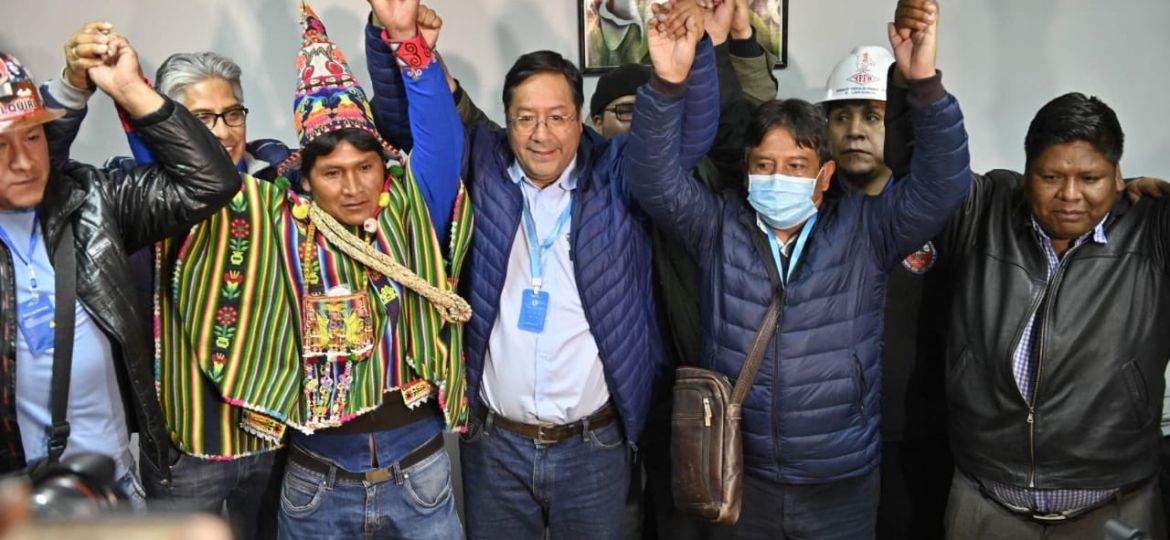
President-elect Luis
Arce (fourth from left), and Vice President-elect David Choquehuanca
(fifth from left).
On October 23, five days after a general election was held in Bolivia, the much-awaited official results were announced by the country's Plurinational Electoral Body. They confirmed and exceeded what exit polls had predicted on October 18: a landslide first round victory for Luis Arce, presidential candidate for the Movement Toward Socialism -- Political Instrument for the Sovereignty of the Peoples (MAS-IPSP) and his vice presidential running mate David Choquehuanca. Luis Arce becomes president with 55.1 per cent of the vote, a 26-point advantage over the runner-up, Carlos Mesa (Civic Community), who received 28.3 per cent. Luis Fernando Camacho (We Believe) finished third with 14 per cent of the vote, followed by Chi Hyun Chung (Front for Victory) with 1.55 per cent, and Feliciano Mamani (National Action Party of Bolivia) with 0.51 per cent. Almost 70 per cent of ballots cast by Bolivian citizens outside of the country went to Luis Arce.
Both Mesa, a former president of Bolivia who was reportedly the preferred candidate of the U.S., and Camacho, a member of a wealthy Santa Cruz family with links to racist paramilitary gangs called "civic committees," participated in last November's coup d’état against President Evo Morales, as part of the chorus alleging, without any proof, that he had fraudulently engineered his own re-election.


Evo
Morales October 18, 2020, at celebration in Buenos Aires, Argentina of
the
MAS-IPSP election victory.
In this year's election MAS-IPSP retained its majority in both chambers of the Plurinational Legislative Assembly, winning 75 of 130 seats in the House of Representatives and 21 of 36 seats in the Senate. The new government is expected to be installed on November 8. Large public celebrations meanwhile began in all earnest on Saturday, October 24, after the official results were announced Friday evening.
Participation in the election was reported as 88.4 per cent of registered voters. Salvador Romero, President of the Supreme Electoral Tribunal (TSE), called the turnout historic for being the largest ever in Bolivia and one of the largest in Latin America in the 21st century -- and because it took place in the middle of a pandemic. The average turnout for elections in Bolivia, where voting is mandatory, is around 80 per cent, he said.
Electoral observers were sent to Bolivia, with others operating remotely from outside the country, by the United Nations, the European Union, the Carter Center in the U.S., the Permanent Conference of Political Parties of Latin American and the Caribbean (COPPPAL) and the parliament of Mercosur (Parlasur). Others that received accreditation included a delegation of Argentinian parliamentarians, a team of journalists organized by the U.S. anti-war group Code Pink and a delegation from the Progressive International. The OAS insulted the Bolivian people by sending an observation mission headed by the same individual -- a former foreign minister from Costa Rica -- who headed last year’s mission that opened the door to the coup. Canada contributed funding and observers to this year's OAS mission, as it had for the one that did the dirty work last year. Not long before election day, with Luis Arce and David Choquehuanca showing a strong lead in all polls, OAS Secretary General Luis Almagro began making noise about the possibility of "another electoral fraud" in Bolivia, indicating he was waiting for a chance to pounce again.
Almagro must be disappointed. None of the national or international election observer missions, including that of the OAS, nor representatives of parties with candidates in the election, have reported having misgivings about the election or the results. The de facto president of the coup government, Jeanine Áñez, as well as other sworn enemies of MAS, including other candidates for president, acknowledged the victory of Luis Arce and David Choquehuanca, conceding their own defeat without even waiting for the official results. The fact that the same voting trends favouring MAS emerged in this election as in last year's, and were accentuated with even more votes this time, makes a strong case against the accusations of spokespersons for U.S. imperialism who say Evo Morales won last year's election through "fraud." Rather it lends weight to the opinion being expressed by many today, that the only fraud was the one the OAS instigated against the Bolivian people.
More evidence for this can be seen in the tenacious fight waged by Bolivian workers and social movements, including many women's and Indigenous organizations, which rallied around the MAS to demand the coup government hold a new election without delay; the massive and enthusiastic participation in rallies supporting MAS's candidates for president and vice president as the election approached; the unprecedented numbers of people who voted in this year's election -- and who they overwhelmingly voted for.
The Communist Party of Canada (Marxist-Leninist) sent a letter of congratulations to President-elect Luis Arce, Vice President-elect David Choquehuanca, the President of MAS-IPSP Evo Morales, and the Bolivian people for their resounding victory in the October 18 General Election. This victory will provide new impetus to the people to not only defend their victory but also forge even stronger unity around their project of building a sovereign and independent Plurinational State of Bolivia in which the rights of all, not just a privileged few, are affirmed, where it is the people of Bolivia and not some hegemonic foreign power or group of powers that decide the affairs of the nation, including the direction of the economy and the country's foreign policy so that Bolivia once again contributes to making Latin America and the Caribbean a zone of peace.
Jallalla Bolivia!
Pickets in Canada Support Bolivian People
On October 18, activists participated in a picket outside the U.S. Consulate in Montreal called by the Quebec Movement for Peace to oppose foreign interference in Bolivia and support the struggle of the Bolivian people for their empowerment. The many placards and slogans expressed the protesters' resolve: No to All Foreign Interference in Bolivia!, Let the People of Bolivia Decide!, Canada, U.S., Hands Off Bolivia!, Full Support to the Bolivian People for Their Emancipation!, Bolivia, Yes! Yankee, No!" Throughout the action, which lasted for over two hours, drivers honked their horns and passers-by stopped to express support. Some denounced Canada's role as a stooge for the U.S. and its interference in the internal affairs of the countries of Latin American and the Caribbean, including through the Lima Group and the Organization of American States.
(Photos: MAS, E. Morales, TML.)
Chilean People Persist in Fight for Recognition of Their Rights
Plebiscite
on New Constitution and
First Anniversary of Revolt Against
Neo-Liberal Piñera Regime
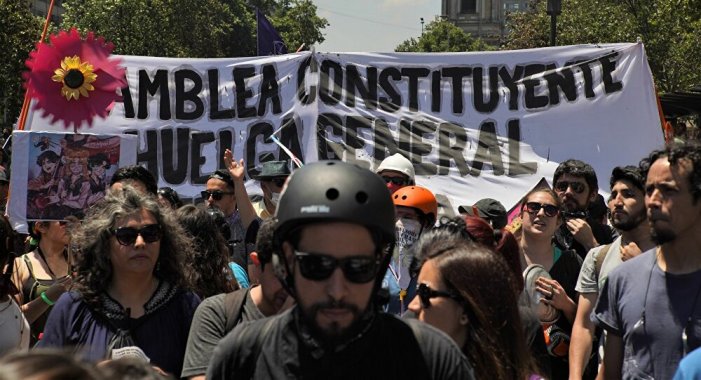
September 9,
2020
march
in support of a new constitution.
One year after the popular revolt against the government of billionaire Sebastian Piñera and its neo-liberal wrecking broke out on October 18, 2019, the Chilean people continue to mobilize and organize to realize the political and economic change they require. They continue to press their major demands for a new constitution and for President Piñera to resign because of his government's anti-social economic measures, corruption and the brutal repression of the people.
TML Weekly salutes the Chilean people for continuing to advance their demands in the face of massive repression and the difficulties imposed by the pandemic, and calls on everyone to support their just cause.
October 25 Plebiscite on New Constitution
On October 25 a plebiscite will
be held on whether to have a new constitution. The vote was originally
scheduled for April, but the pandemic caused a postponement until
October 25. On November 15, 2019, the people's sustained mass actions
achieved a preliminary step in establishing the new constitution, when
the deputies in the National Congress agreed that a plebiscite for a
new constitution should be held.
The country's current constitution was written in 1980 and enshrines neo-liberal economic and reactionary political arrangements made during the Pinochet dictatorship, despite the end of the dictatorship in 1990.[1]
The plebiscite will ask Chileans whether they want a new constitution and, if so, whether it should be drafted by ordinary Chileans or a combination of citizens and legislators. If it is decided to have a new constitution, another vote on April 11, 2021 (in conjunction with municipal and gubernatorial elections) would elect members to the constitutional convention responsible for drafting a new constitution. A third vote in 2022 would decide whether to accept the new constitution.
A month before the vote, a grouping of political parties and organizations in favour of a new constitution launched an initiative called "We Approve a Dignified Chile" to promote a manifesto that the new constitution should enshrine rights such as the right to vote for those over 16 years of age; the right to free, quality public education at all levels; the creation of a social security system with tripartite financing and universal coverage; the right to housing; and the right to health care, among other demands.
On October 20, Marcos Barraza, former Minister of Social Development in the government of President Michelle Bachelet, warned that a plebiscite victory does not necessarily mean that those who benefit from maintaining the status quo have been defeated, and it is up to the progressive forces to properly reflect social rights in a new constitution. He added that one of the main strategies of those in favour of leaving the current constitution largely intact is to present the plebiscite as a simple democratic exercise without any real impact on people's lives.
News agencies report that the latest polls show 72 per cent of the population is in favour of a new constitution.
Mass Protest Marks First Anniversary of Popular Revolt
On October 18, tens of thousands of people rallied in Santiago's central square, Plaza Baquedano -- renamed Dignity Square by the people as a symbol of their striving for pro-social arrangements -- to mark one year of protests in which millions of people have taken to the streets. The mass action took place in defiance of the Piñera government's ongoing repression of the people's movement. On that day, 40,000 Carabineros -- the national police force -- armed with water cannons and tear gas were deployed against them.
The protests, which began early in the morning, advanced the demands of the upcoming October 25 plebiscite, and commemorated those who have been killed, injured, tortured and abused by state security forces over the past year.
Figures compiled by the North American Congress on Latin America indicate that by the end of February, 36 people had been killed in the protests, with 11,564 injured and 28,000 detained. According to Chile's National Institute of Human Rights (INDH), 964 people have been injured by rubber bullets, including 222 with eye injuries. The Chilean Ophthalmology Society states this is the highest number of such injuries recorded in any protests or conflict zones worldwide.
On October 3, a carabinero was caught on video pushing a 16-year-old youth off the Pio Nono Bridge in Santiago into the Mapocho River, which triggered mass protests demanding the resignation of the Chief of the Carabineros, General Mario Rozas. Although police originally claimed that the youth jumped into the river of his own accord, the officer was later charged with attempted murder.
Note
1. A December 10, 2019 article by Camila Osorio in the New Yorker informs that the current constitution "was completed in 1980 and approved in a plebiscite that was widely viewed as fraudulent. Left-wing political parties were banned, and the armed forces were made the 'guarantors' of the state. The fourteenth chapter provided the key: any amendments to the constitution would pass only if approved by three-fifths of the Congress. If the President vetoed an amendment, it would require the votes of three-fourths of Congress to override it. If the President were to veto just parts of a reform, Congress would need a two-thirds majority to override that. If a reform were to pass all these obstacles, it would still face review from a constitutional tribunal, which had the power to reject it. [...]
"A particularly important aspect of the new process was that it insured that large majorities would be needed to challenge the neo-liberal economic policies that the junta was implementing. With the help of free-market economists who had studied under Milton Friedman, at the University of Chicago, Pinochet cut public spending, deregulated the banks, freed interest rates, and privatized the health, education, and pension systems."
(With files from teleSUR, Washington Post, Guardian, New Yorker. Photo: Izquerido Diario Chile.)
Strengthening Canada-Cuba Relations
Canadian Network on Cuba
Holds
Virtual Conference
On Saturday, September 26, member organizations of the Canadian Network on Cuba (CNC) from Victoria to Halifax, and invited guests met virtually to discuss solidarity and friendship with Cuba in the current situation and to plan for the coming year.
It was acknowledged that in these unprecedented times of pandemic, deepening economic crisis and ever-growing danger of war, the Cuba solidarity movement faces unique challenges. The main factor shaping this context is the Trump regime's assault on Cuba and the unsettling developments in Canada-Cuba relations.
CNC executive co-chairs, Elizabeth Hill and Isaac Saney, gave an extensive review of CNC work since its convention held on June 8 and 9, 2019. The report, with a lively visual display, highlighted, among other things:
- the campaign to reinstate visa services at the Canadian Embassy in Havana;
- the successful Support Cuba to Fight Against COVID-19 campaign that has raised over $50,000 for Cuba's international medical solidarity;
- the various CNC webinars on Cuba's medical accomplishments;
- the ongoing virtual pickets against the U.S. blockade, which has had participation by over 20 countries;
- the Saving Lives Campaign (a joint initiative of the CNC, the U.S. National Network On Cuba and the Table de Concertation et de Solidarité Québec-Cuba) aimed at establishing medical cooperation between the U.S., Canada and Cuba, especially in the fight against COVID-19;
- the Cubacan6060 fundraising for baseball bats for Cuba;
- the statements of CNC Spokesperson Isaac Saney, ranging from the 60th anniversary of the triumph of the Cuban Revolution to a condemnation of the violent attack on the Cuban Embassy in Washington, DC and open letters to Prime Minister Trudeau and the Minister of Foreign Affairs.
 Isaac Saney
followed the CNC report with an outline of the Trump regime's ongoing
and intensifying attacks against Cuba, as well as the growing
uncertainty and worrying directions in Canada-Cuba relations. He
reiterated that one of the CNC's principal objectives is advocating
that Canadian foreign policy regarding Cuba remains based on equality
and respect for sovereignty and the right of self-determination. Thus,
a central aim is strengthening the Canada-Cuba solidarity movement and
defeating the U.S. all-sided economic blockade of and aggressions
against Cuba.
Isaac Saney
followed the CNC report with an outline of the Trump regime's ongoing
and intensifying attacks against Cuba, as well as the growing
uncertainty and worrying directions in Canada-Cuba relations. He
reiterated that one of the CNC's principal objectives is advocating
that Canadian foreign policy regarding Cuba remains based on equality
and respect for sovereignty and the right of self-determination. Thus,
a central aim is strengthening the Canada-Cuba solidarity movement and
defeating the U.S. all-sided economic blockade of and aggressions
against Cuba.
Janine Solanki, National Coordinator of the Ernesto Che Guevara Volunteer work brigade, then presented the challenges of organizing the 27th brigade within the COVID-19 pandemic. Despite these challenges, the cross-Canada brigade committee has made great strides towards ensuring a successful brigade scheduled for April 28-May 10, 2021.
Tamara Hansen, a CNC executive member, laid out a series of ideas and proposals for building Cuba solidarity during the time of the COVID-19 pandemic. She outlined how the webinars and the virtual anti-blockade pickets illustrate the many ways that the Cuba friendship and solidarity movement can expand its reach and impact, nationally and internationally. A key future initiative is the plan to organize a 24-hour world virtual picket on December 17 opposing ongoing U.S. aggressions against Cuba. She also highlighted that the CNC is ready and able to assist members in their local work, particularly via the CNC Zoom account that is available for all groups to use.
Each of the 14 CNC member groups participating in the gathering then gave a report of their solidarity activities and initiatives. The summation of the work of the CNC and its member organizations over the previous year highlights the breadth and diversity of activities across the country, encompassing the political, social and cultural spheres. The conference participants reaffirmed their commitment to strengthen the Canada-Cuba solidarity movement and the ties of solidarity and friendship between the Canadian and Cuban people. They further resolved to redouble their efforts to defeat the U.S. all-sided economic blockade of and criminal aggressions against Cuba and working to ensure that Canadian foreign policy regarding Cuba remains based on equality and respect for Cuba's sovereignty and right of self-determination.
(Canadian Network on Cuba, October 17, 2020. Photos: CNC)
Virtual Conference on
Current Situation in Cuba
and Its Foreign Policy
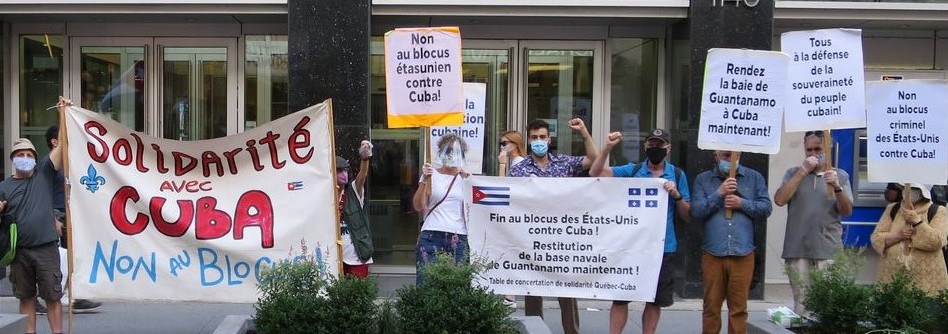
Montreal, August 17, 2020
Saturday, October 24
4:00 pm Eastern
Guest: Josefina Vidal, Ambassador of Cuba to Canada
Participate in the Zoom meeting here.
Meeting ID: 818 9293 9129
Password: 396657
The Table de concertation de solidarité Québec-Cuba invites you to join a virtual conference where Josefina Vidal, Cuba's Ambassador to Canada, will discuss the current situation in Cuba in the context of the pandemic and the intensification of the blockade, as well as her country's foreign policy.
Webinar: Canada-Cuba
Relations in the Time
of Trump and COVID-19

Ottawa, September 17,
2020.
Thursday, October 29
8:00 pm Atlantic; 7:00 Eastern; 4:00 pm Pacific
With videos, speakers and discussion
For webinar poster click here
Organized by the Canadian Network on Cuba
For information: visit canadiannetworkoncuba.ca or Facebook
Register for Zoom here.
Cuba's contribution to the global struggle against the Covid-19 pandemic has been held up as an example of success and solidarity, both internally and for their assistance to 42 countries worldwide. While Cuba's Henry Reeve International Medical Brigade receives praise for its international cooperation during these difficult times, the United States government has tightened its immoral and illegal U.S. blockade on Cuba. From here in Canada, it is crucial that we continue challenging these cruel policies through building stronger Canada-Cuba solidarity.
Join the Canadian Network on Cuba (CNC) and our dynamic guest speakers for an important discussion about the state of Canada-Cuba relations and strengthening our people to people solidarity with Cuba.
Featuring:
• Her Excellency Josefina Vidal, Cuban Ambassador to Canada. Previously, she was president of the Cuban delegation in the first and second rounds of Cuba-U.S. talks, which paved the way for the restoration of diplomatic relations between both countries under Cuban President Raul Castro and U.S. President Barack Obama
• MP
Niki Ashton, Member of Parliament for Churchill --
Keewatinook
Aski, Manitoba
• MP Matthew Green, Member of Parliament for Hamilton Centre, Ontario
• Senator Pierrette Ringuette, Independent senator for New Brunswick and Co-Chair of the Canada-Cuba Inter-Parliamentary Group
• Dr. John Kirk, Cuba Researcher and Professor, Dalhousie University
• Dr. Isaac Saney, Co-Chair of Canadian Network on Cuba & Professor, Dalhousie University
Event Co-Chairs:
• Tamara Hansen, Executive member of the Canadian Network on Cuba, Coordinator of Vancouver Communities in Solidarity with Cuba (VCSC)
• Elizabeth Hill, Executive member of the Canadian Network on Cuba and President of the Canadian Cuban Friendship Association-Toronto
Mexican Congress for Sovereignty Marks 10th Anniversary
Sixth
National Convention Highlights
Achievements and Challenges
On October 2, the Congress for Sovereignty held its Sixth National Convention on the 10th anniversary of its founding under the theme "The People Take Up Their Sovereignty."
On that occasion, and after months of discussion among all the members of the organization, 13 resolutions were adopted that reflect the will to provide the country with a concrete program to move forward after the COVID-19 pandemic, for the realization of the sovereignty and well-being of the people. Due to the restrictions imposed by the pandemic, the Congress convened its national convention live via Zoom and Facebook. Some 1,300 people were thus able to participate in the public session of the convention.
Highlights of the national convention included the presentation of the Sovereignty Award of Merit and paying tribute to the renowned Mexican Victoria Novelo, as well as to two of our close companions, Jesus Escamilla and Virgilio Caballero. As well, José Crespo, the former Bolivian Ambassador to Mexico, who is currently a political refugee in our country, delivered a message to the convention and explained the current situation in Bolivia. Messages and videos were also received during the convention from the Communist Party of Canada (Marxist-Leninist) and the U.S. Marxist-Leninist Organization. The convention also adopted a resolution to join the international campaign to award the Nobel Peace Prize to Cuba's Henry Reeve Medical Brigade for its international solidarity work. A special moment was also devoted to the important issue of water and a message of greetings was received from Pedro Moctezuma, national coordinator of Agua para Tod@s.
Finally, as part of the cultural program in which several songs about the struggles waged by the people were performed, there was a tribute to the 43 students from the teachers college in Ayotzinapa who were disappeared six years ago, with the performance of the song Camino, composed in their honour.
Below are the titles of the 13 resolutions adopted by the Congress for Sovereignty at its Sixth National Convention:
1. Guaranteeing the rights and integrity of women;
2. Prioritizing the health and well-being of the people;
3. Solidarity economy and a sovereign state;
4. Food sovereignty;
5. Financial sovereignty and the suspension of debt payments;
6. Education;
7. Culture, identity and historical memory;
8. Water for all;
9. Guaranteed labour rights;
10. Cancellation of mining concessions and protection of the environment;
11. Defence of human rights denied by capitalism;
12. Democratic renewal and a new constitution;
13. International solidarity. Respect for sovereignty.
Looking back to when the Congress for Sovereignty was founded in Mexico City on October 2, 2010, the country was marking the 200th anniversary of its independence and the 100th anniversary of the start of the Mexican Revolution. The Congress was founded for us to take up our sovereignty in leading the struggles to carry forward our liberation movement into the 21st century.
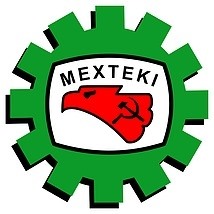 In 2010, at the initiative of
Mexteki,[1]
following 16 years of a process of economic integration, five years of
energy and security policy integration, and three years of our
country's military integration with the United States of North American
Monopolies, the Congress for Sovereignty raised the banner of full
independence for Mexico and for an end to the neo-colonial, neo-liberal
and pro-business regime promoted by the Institutional Renewal Party of
National Action (PRIAN).
In 2010, at the initiative of
Mexteki,[1]
following 16 years of a process of economic integration, five years of
energy and security policy integration, and three years of our
country's military integration with the United States of North American
Monopolies, the Congress for Sovereignty raised the banner of full
independence for Mexico and for an end to the neo-colonial, neo-liberal
and pro-business regime promoted by the Institutional Renewal Party of
National Action (PRIAN).
The task that the Congress for Sovereignty took up 10 years ago was to contribute to a regime change to transform Mexico into a country in which the people rule and remain independent from the project for its integration into the North American region as a bloc linked to the U.S. Empire. Our slogan was and remains: that the people assume their sovereignty! We call for the unity of all people in the struggle for sovereignty irrespective of their ideology, political party, religious beliefs, age, gender, skin colour, national origin, socio-economic situation, sexual orientation or lifestyle.
These have been 10 years of relentless work which have seen our action develop throughout the Mexican Republic and our relations with the peoples of the world fighting for their sovereignty with consistency and commitment expanded. From our trenches, we support struggles internationally as well as across the Americas; we strengthen our ties with the peoples of Latin America and the Caribbean, as well as with those in the U.S. and Canada, and support the struggles of the peoples of the rest of the planet.
The decisions of our organization are collective, discussed in depth and voted on democratically. Our action is not determined by events but through a plan preconceived by all. Our action makes us a factor of unity within the movement. We seek to eliminate the pressure that people only have to follow the leader, so that everyone can act consciously and collectively. For consciousness to develop, we accept the premise that understanding requires the conscious participation of the individual, an act of finding out, within the framework of collective action. Nothing can be learned with the attitude of simply following in a passive and conformist manner. Our decisions are based on action, the experience of the struggle and our goal of the triumph of national and popular sovereignty, of the sovereignty of each region and locality.
We have defended a program and national project above personal interests. We act to defend the unity of the democratic movement and indeed, the unity within our organization is vital; we reject personal or dogmatic attacks that divert us from the main struggle and serve only our enemies.
During our national convention in May 2012, we decided to support the struggle to bring down the PRIAN and to support Andrés Manuel López Obrador's candidacy for the presidency. That same year we supported the creation of Morena[2] to defeat the PRIAN regime and reverse the energy, educational and other reforms promoted by the Pact for Mexico. We supported the creation of committees across the country and fought for the democratization of Mexico.
The call for political and economic sovereignty implies the sovereignty of the agricultural and industrial sectors and of services of all kinds.
Within that context, we carried out local work in one of the municipalities of Mexico City and, with the support of the people of Azcapotzalco, assumed its governance. We did this without money or concessions. And, despite the regime having assured there would be continuity in that delegation, we defeated the entire fraudulent vote-buying apparatus and demonstrated that people can succeed if they go into action.
During the 2015-2018 period we developed a democratic government, confronting the power of the federal government, of the central government of Mexico City and local provocations. We worked on a project in which the popular will -- despite all the pressures -- was placed above realtors, influence peddlers, water hoarders and criminal mafias.
Once the objective of defeating the neo-liberal regime led by the PRIAN was attained, thanks to the electoral mobilization of 30 million Mexicans which gave Andrés Manuel López Obrador the presidency, a process, referred to as the Fourth Transformation, began. We need to work so that this fourth transformation of our country results in the defeat of neo-colonialism and the construction of a fully sovereign country. Following the electoral triumph of July 1, 2018, the Congress for Sovereignty held its Fourth National Convention, during which a National Project in the form of seven resolutions, which summarize the main issues, was approved:
1. The defence of energy sovereignty and the sovereignty of strategic sectors;
2. Self-sufficiency and defence of food sovereignty;
3. Water, oil and mines are riches for Mexicans;
4. Rejection of the integration of Mexico into the United States of North American Corporations;
5. Strengthening of the social and popular economy and the defence of migrants in the United States and Mexico;
6. Defence of the rights of all;
7. Peace, security and justice.
Pablo Moctezuma Barragán is the national spokesperson for the Congress for Sovereignty.
Notes
1. Mexteki is the Marxist-Leninist organization, Union of Mexican Workers.
2. Morena is the organization founded by Andrés Manuel López Obrador in 2011, first as a movement then registered as a political party. The party won the 2018 elections and currently forms the federal government, the government of the National Capital, and heads the Congress in several states across the country as well as over a thousand municipal governments.
(Translated from original Spanish by TML.
Photos: Mexteki.)
|
|
(To access articles individually click on the black headline.)
Website: www.cpcml.ca Email: editor@cpcml.ca


 Abel Bosum, Grand
Chief of the Grand Council of the Crees (Eeyou Istchee) and Chairperson
of the Cree Nation Government, signed the MOU on behalf of the Eeyou
Istchee while Premier François Legault signed for the Quebec
government.
Abel Bosum, Grand
Chief of the Grand Council of the Crees (Eeyou Istchee) and Chairperson
of the Cree Nation Government, signed the MOU on behalf of the Eeyou
Istchee while Premier François Legault signed for the Quebec
government.
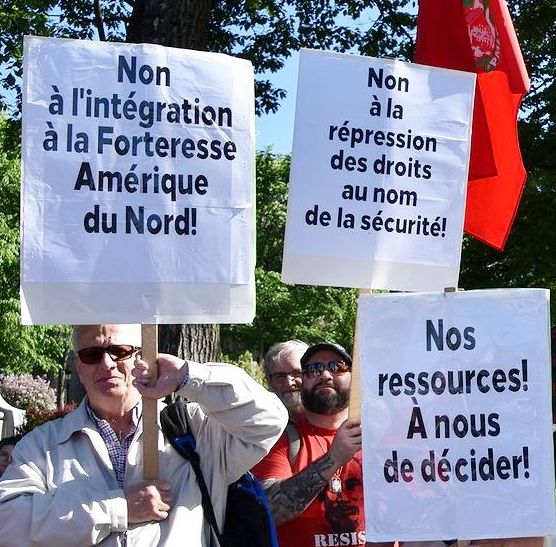 Fitzgibbon said,
"It is an airship that takes a 60-tonne payload. We could transport
houses to the far north; we could extract minerals, rare earths. It is
a French group, which includes the Paris airport, Boeing, large French
companies. We are investing 20 million euros. We have the rights in the
Americas. And the French will invest the equivalent of what we invest
in research and development here in Quebec. Here, we have a very
efficient industrial cluster in aerospace, artificial intelligence,
[and] our engineers. We anticipate that the project will be operational
in 2022-2023. We can think of places in the far North, the James Bay
territory, where there are no roads and airships that can carry 60
tonnes are more useful than putting billions into the construction of
roads and railways. These airships will be complementary to our
strategy to develop northern Quebec. This system will complement the
traditional transport system."
Fitzgibbon said,
"It is an airship that takes a 60-tonne payload. We could transport
houses to the far north; we could extract minerals, rare earths. It is
a French group, which includes the Paris airport, Boeing, large French
companies. We are investing 20 million euros. We have the rights in the
Americas. And the French will invest the equivalent of what we invest
in research and development here in Quebec. Here, we have a very
efficient industrial cluster in aerospace, artificial intelligence,
[and] our engineers. We anticipate that the project will be operational
in 2022-2023. We can think of places in the far North, the James Bay
territory, where there are no roads and airships that can carry 60
tonnes are more useful than putting billions into the construction of
roads and railways. These airships will be complementary to our
strategy to develop northern Quebec. This system will complement the
traditional transport system."
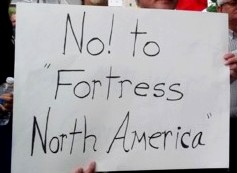 Canada and the
U.S. announced on January 9 that they had finalized the Canada-U.S.
Joint Action Plan on Critical Minerals Collaboration as part of
Canada's Integration into the U.S. imperialist war economy, as reported
in
Canada and the
U.S. announced on January 9 that they had finalized the Canada-U.S.
Joint Action Plan on Critical Minerals Collaboration as part of
Canada's Integration into the U.S. imperialist war economy, as reported
in  After putting $80
million of public funds in the Nemaska Lithium private mining and
metallurgical venture in May 2018, the Quebec government again came to
the rescue of the company, which filed for bankruptcy in December 2019.
On August 20, Minister of Economy and Innovation Pierre Fitzgibbon
announced that the Quebec government was buying back Nemaska Lithium
along with two other private firms: Orion Mine Finance Group, Nemaska's
biggest secured creditor, and Pallinghurst, a UK-based mining and
metals private equity firm. The Quebec government will pay a huge
portion of the $146.5 million in liabilities owned in part by Orion.
Many small investors who had put their life savings into this venture
lost everything. The Quebec government will also put in another
$200-300 million of public funds in order to keep Pallinghurst as a
"partner" in the rescue package.
After putting $80
million of public funds in the Nemaska Lithium private mining and
metallurgical venture in May 2018, the Quebec government again came to
the rescue of the company, which filed for bankruptcy in December 2019.
On August 20, Minister of Economy and Innovation Pierre Fitzgibbon
announced that the Quebec government was buying back Nemaska Lithium
along with two other private firms: Orion Mine Finance Group, Nemaska's
biggest secured creditor, and Pallinghurst, a UK-based mining and
metals private equity firm. The Quebec government will pay a huge
portion of the $146.5 million in liabilities owned in part by Orion.
Many small investors who had put their life savings into this venture
lost everything. The Quebec government will also put in another
$200-300 million of public funds in order to keep Pallinghurst as a
"partner" in the rescue package.